Rulers
Index Le-Lh
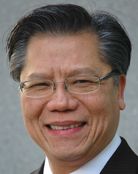
Le |
Le, Hieu Van (b. 1954, central Vietnam), governor of South Australia (2014-21).
Le Beau, (Jacques) Georges (b. March 11, 1879, Gien, Loiret, France - d. March 9, 1962, Châteauroux, Indre, France), governor-general of Algeria (1935-40). He was also prefect of the French départements of Creuse (1921-24), Vienne (1924), Oise (1926-34), and Seine-Inférieure (1934-35).
Le Boucher, Adolphe (Ernest Auguste) (b. Oct. 8, 1837, Caen, Calvados, France - d. [suicide] Feb. 1, 1896, Toulouse, France), acting governor of Senegal (1883) and governor of New Caledonia (1884-86) and Guadeloupe (1886-91).
Le Bourdon, Raymond (Joseph Marie) (b. March 18, 1861 - d. Sept. 22, 1937), minister of state of Monaco (1919-23). He was also prefect of the French départements of Manche (1911-13), Indre-et-Loire (1913-19), and Marne (1919).
Le Breton, David (Francis Battye) (b. March 2, 1931, London, England), commissioner of Anguilla (1974-78).
Le Breton (Ibarguren), Tomás Alberto (b. March 20, 1868, Buenos Aires, Argentina - d. Feb. 17, 1959, Buenos Aires), acting foreign minister of Argentina (1922). He was also minister to the United States (1919-22), agriculture minister (1922-25), and ambassador to France (1930-38) and the United Kingdom (1938-42).
Le Cardinal, Léonce Pierre Henri (b. March 9, 1830, Basse-Terre, Guadeloupe - d. ...), governor of French Guiana (1885-87).
Le Cheminant, Sir Peter (de Lacey) (b. June 17, 1920, Guernsey - d. April 8, 2018, Guernsey), lieutenant governor of Guernsey (1980-85); knighted 1972.
Le Clos, Alexandre Marie (b. Aug. 15, 1828, Saint-André, Île Bourbon [now Réunion] - d. ...), interim commandant of Saint-Pierre and Miquelon (1868-69) and commandant of Nossi-Bé (1872-73).
Le Cocq, Sir Timothy (John) (b. Dec. 9, 1956, Jersey), bailiff of Jersey (2019- ); knighted 2022.
Le Cornec, Jacques (Jean Louis) (b. Nov. 29, 1927, Fleury-sur-Andelle, Eure, France - d. Sept. 1, 2022, Quimper, Finistère, France), prefect of Guadeloupe (1973-75). He was also prefect of Orne département (1975-79).
Le Couriault du Quilio, Antoine Louis (Marie) (b. May 29, 1815, Quimper, Finistère, France - d. Sept. 9, 1877), commandant of the Naval Division of the Western Coasts of Africa (1872-74).
Le Despencer, Francis Dashwood, (11th) Baron (b. December 1708, London, England - d. Dec. 11, 1781, West Wycombe, Buckinghamshire, England), British chancellor of the exchequer (1762-63). He succeeded as (2nd) Baronet in 1724 and as Baron Le Despencer in 1763.
Le Direach, Jean (Julien Émile) (b. June 25, 1924, Choisy-le-Roi, Seine [now in Val-de-Marne], France - d. Nov. 10, 2003, Marseille, France), prefect of French Guiana (1977-80).
Le Divellec, Jean-Marie (b. Jan. 19, 1853, Vannes, Morbihan, France - d. Dec. 13, 1896, Vannes), acting commissioner-general of French Congo (1894).
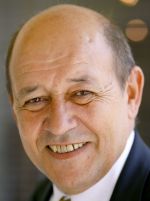
Le Drian |
Le Drian, Jean-Yves (b. June 30, 1947, Lorient, Morbihan, France), president of the Regional Council of Bretagne (2004-12, 2015-17) and defense minister (2012-17) and foreign minister (2017-22) of France. He was also mayor of Lorient (1981-98).
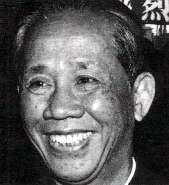
Le Duan |
Le Duan, also called Le Dung (b. April 7, 1908, Quang Tri province [now Binh Tri Thien province], Vietnam - d. July 10, 1986, Hanoi), Vietnamese politician. He became politically active as a railway worker in the 1920s and joined the Indochinese Communist Party on its foundation in 1930. He was twice imprisoned by the French for 10 of the next 15 years, then joined the Viet Minh, the anti-French coalition led by Ho Chi Minh's Communists, and attained an influential position on the Central Committee of Ho's new Republic of Vietnam in 1945. He helped put in place a party structure in southern Vietnam (Cochinchina), a relative backwater during the first Indochina war. This underground party organization remained after Vietnam's partition in 1954. In the late 1950s he carried through the collectivization of agriculture in North Vietnam. Active guerrilla war began against the South Vietnam government around 1959, and he oversaw the creation in 1962 of the People's Revolutionary Party, a crucial component of the National Liberation Front. Upon Ho's death in 1969, Le Duan assumed leadership of the Vietnam Workers' Party as first secretary, a post he held since 1960; after the party's reorganization as the Vietnamese Communist Party in 1976, his official title became general secretary. He led the party through the victory in the Vietnam War (1975), the formal reunification of Vietnam (1976), and a difficult period afterwards that saw the Vietnamese invasion of Cambodia (1978), which led to a break with China, the expulsion of much of Vietnam's ethnic Chinese community, and the entrance into a close alliance with the Soviet Union, with Vietnam joining the Council for Mutual Economic Assistance.

Le Duc Anh |
Le Duc Anh (b. Dec. 1, 1920, Truong Ha, Phu Vang district, Vietnam - d. April 22, 2019, Hanoi, Vietnam), defense minister (1987-91) and president (1992-97) of Vietnam.

Le Duc Tho |
Le Duc Tho, original name Phan Dinh Khai (b. Oct. 14, 1911, Nam Ha province, Vietnam - d. Oct. 13, 1990, Hanoi), Vietnamese politician. In 1930, at age 19, he joined with other anticolonialist youths, including Ho Chi Minh, to organize the Indochinese Communist Party. He was arrested in the same year and sentenced to forced labour; released in 1936, he was arrested again in 1939 and remained imprisoned until late 1944. He returned to Hanoi in 1945 and helped lead the nationalist Viet Minh organization, which declared Vietnam independent, as well as a revived Communist party called the Vietnam Workers' Party. He became a member of the Central Committee (1945) and of the Politburo (1955) of the Vietnam Workers' Party (from 1976 Communist Party of Vietnam). He became a leading member of the secretariat of its Central Committee in 1960. He oversaw the Viet Cong insurgency that began against the South Vietnamese government in the late 1950s. He was special adviser to the North Vietnamese delegation to the 1968-73 Paris peace conferences, eventually becoming his delegation's principal spokesman. In 1970 he entered into meetings with U.S. national security advisor Henry Kissinger, which remained secret until 1972. He negotiated the 1973 ceasefire agreement that led to the withdrawal of the last American troops from South Vietnam. For this he and Kissinger were awarded the Nobel Peace Prize. Le Duc Tho declined his, saying, "Peace has not yet really been established." Fighting between the two Vietnamese sides continued. He oversaw the North Vietnamese offensive that finally overthrew the South Vietnamese government in 1975, and also directed the first stages of Vietnam's invasion of Cambodia in 1978. He resigned from his party posts in 1986, but remained influential.
Le Flô, Adolphe Charles (Emmanuel) (b. Nov. 2, 1804, Lesneven, Finistère, France - d. Nov. 16, 1887, Nec'hoat castle, near Morlaix, Finistère), war minister of France (1870-71). He was also minister (1848-49) and ambassador (1871-79) to Russia.
Le Fol, Aristide (b. Dec. 31, 1838, Quimperlé, Finistère, France - d. 1923), interim commandant (1886) and interim governor (1887-88) of Saint-Pierre and Miquelon and acting governor of New Caledonia (1896-97).
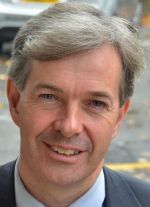
Le Fondré |
Le Fondré, John (Alexander Nicholas) (b. 1966?), chief minister of Jersey (2018-22).
Le Franc, Louis (b. Oct. 15, 1960, Loudéac, Côtes-du-Nord [now Côtes-d'Armor], France), high commissioner of New Caledonia (2005 [acting], 2023- ; secretary-general of New Caledonia 2004-06). He was also prefect of the French départements of Haute-Corse (2011-13), Aude (2013-15), Indre-et-Loire (2015-17), Oise (2017-20), and Pas-de-Calais (2020-22).
Le Gallen, Maurice (Joseph) (b. Nov. 20, 1873, Tréguier, Côtes-du-Nord, France - d. Jan. 28, 1955), acting resident-superior of Cambodia (1914), resident-superior of Tonkin (1915-16), and governor of Cochinchina (1916-21).
Le Hoai Trung (b. April 27, 1961, Hanoi, North Vietnam), Vietnamese diplomat. He was permanent representative to the United Nations (2011-14).
Le Hunte, Sir George Ruthven (b. Aug. 20, 1852, Artramont, County Wexford, Ireland - d. Jan. 29, 1925, Crowborough, Sussex, England), president of Dominica (1887-94), lieutenant governor of British New Guinea (1899-1903), and governor of South Australia (1903-09) and Trinidad and Tobago (1909-16); knighted 1903.

Le Kha Phieu |
Le Kha Phieu (b. Dec. 27, 1931, Dong Khe, Dong Son district, Thanh Hoa province, Vietnam - d. Aug. 7, 2020, Hanoi, Vietnam), general secretary of the Communist Party of Vietnam (1997-2001). He joined the army in 1948. During the war against the French in the early 1950s and during the 1960s he held a series of political posts in the North Vietnamese army. In 1974, near the end of the Vietnam War, he was appointed the head of the political office of the second Army Corps. He was deputy commander of Vietnam's forces in 1984-88 during the Vietnamese occupation of Cambodia. His appointment in 1991 as head of the army's general political section was viewed as a move to keep firm ideological control over a Communist country undergoing rapid economic and social reforms. He was also tasked with helping the military adapt to financial cutbacks and a depletion of manpower from the million-strong army of the late 1980s to around 570,000 people. In a tough 1993 commentary in the Quan Doi Nhan Dan army daily he urged soldiers to be on guard against efforts by "imperialists" to foment unrest, destroy socialism, and depoliticize the army. He was elected to the powerful Politburo in January 1994 and was then running the day-to-day affairs of the party. At a Communist Party congress in 1996 he was one of only two people from outside the leadership troika to be appointed to the politburo's inner Standing Board - an elite grouping of the country's most powerful individuals. In the months that followed that meeting he succeeded in consolidating his power and his hopes of elevation to the country's leadership. When he became general secretary in 1997, he was seen as the most conservative member of the new troika. He failed to be reelected in 2001, ostensibly because of his age.
Le Layec, Paul (Hippolyte Julien Marie) (b. Jan. 19, 1901, Séné, Morbihan, France - d. Aug. 26, 1965, Séné), acting governor of Chad (1949) and governor of Middle Congo (1950-52).
Le Luong Minh (b. Sept. 1, 1952, Thanh Hoa, Vietnam), secretary-general of the Association of Southeast Asian Nations (2013-18). He was also Vietnamese permanent representative to the United Nations (2004-11).
Le Maire, Bruno (Marie Maurice) (b. April 15, 1969, Neuilly-sur-Seine, Hauts-de-Seine, France), economy minister of France (2017- ). He was also minister of agriculture, food, and fish (2009-12) and rurality and regional planning (2010-12).
Le Maitre, Alexandre (Charles) (b. Dec. 11, 1836, Locminé, Morbihan, France - d. ...), commandant of Nossi-Bé (1883-86).
Le Masurier, Sir Robert Hugh (b. Dec. 29, 1913, St. Helier, Jersey - d. July 30, 1996, Oaklands Manor, Jersey), bailiff of Jersey (1962-74); knighted 1966.
Le Myre de Vilers, Charles (Marie) (b. Feb. 17, 1833, Vendôme, Loir-et-Cher, France - d. March 9, 1918, Paris, France), governor of Cochinchina (1879-82) and resident-general of Madagascar (1886-88, 1894-95). He was also prefect of the départements of Alger (1869-70) and Haute-Vienne (1873-77) and minister to Siam (1893-94).
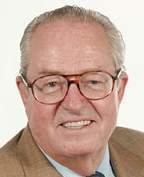
J.-M. Le Pen |
Le Pen, Jean-Marie (Louis) (b. June 20, 1928, La Trinité-sur-Mer, Morbihan, France), French politician. His political career began at the end of 1955. A volunteer in the parachute regiment, he had just returned from Indochina when he met Pierre Poujade, who needed associates to help lead his far right-wing movement of tradesmen and skilled workers. Le Pen, at the age of 27, was selected as a "Poujadist" candidate and in January 1956 was elected in Paris to become the youngest member of the National Assembly. A born activist, Le Pen was not averse to a brawl at a public meeting and never missed an uproar in the Assembly. He re-enlisted in Algeria and took part in military operations there in 1956 and 1957 before being expelled from Algiers because he was considered a liability by those who planned to establish an "Algérie française." In 1972 he formed the National Front (FN), which was launched to the fore of the French political scene by the European Parliament elections on June 17, 1984, unfurling anew the banner of the neofascist right at a time when all other French parties were losing ground. The FN made no secret of its xenophobia and added a racist odour to its neo-Poujadist slant. It gained 11% of the vote overall; in Paris, which had for some time been shifting to the right, the party got more than 15%; and in Lyon it reached 17%. Legislative elections in 1986 and the presidential elections of 1988 and 1995 confirmed his hold, Le Pen's party consistently getting some 15% of the vote. In 1987 he called Nazi gas chambers "a detail of World War II history," a remark for which he was fined in court. His biggest success came in the 2002 presidential election, when he came in second with 17%, edging out Socialist Lionel Jospin; however, he could not improve on this result in the runoff against Jacques Chirac. In 2007 he polled only 10%. He retired from the party leadership in 2011 and was succeeded by his daughter Marine.
Le Pen, Marine, original name Marion Anne Perrine Le Pen (b. Aug. 5, 1968, Neuilly-sur-Seine, France), French politician; daughter of Jean-Marie Le Pen. She took over leadership of the National Front from her father in 2011, but sharply broke with him in 2015 after she moved the party somewhat away from its extreme-right position, particularly as far as anti-Semitism was concerned, and successfully made it an option to wider sections of the electorate. In the 2012 presidential elections she won only 18% of the vote, coming third, but in 2017 she placed second with 21%, then lost to centrist Emmanuel Macron in the runoff, winning 34%. Though this was the expected outcome, there had been serious worries about the possibility of another right-populist upset following the U.K. "Brexit" vote and Donald Trump's victory in the U.S. in 2016. In 2015 she had won 42% in the second-round vote as candidate for president of the Regional Council of Nord-Pas-de-Calais-Picardie. In the 2017 parliamentary election, she won a seat for herself, and her party took a total of 8 seats, an improvement on the 2 seats at most that it previously won under the present (non-proportional) electoral system. In 2018 she renamed the party National Rally (RN) in a further attempt to shed the baggage associated with her father. In the 2022 presidential election, she again came second to Macron, with 23% (despite the presence in the race of another prominent far-right candidate, Éric Zemmour), and again lost the runoff, but this time won 41.5% of the vote. Some polls had put her even higher, so that there was much relief at the result in the West, where her victory would have shaken the united front against Russia in the Ukraine war, given that she had previously supported (and been supported by) Russian president Vladimir Putin. Later in 2022 she gave up the RN leadership to focus on leading the party's group in parliament.
Le Roux, Bruno (b. May 2, 1965, Gennevilliers, Seine [now in Hauts-de-Seine], France), interior minister of France (2016-17).
Le Roux, Pieter Mattheus Kruger (b. Nov. 11, 1904, Doornkraal farm, near De Rust, Cape Colony [now in Western Cape, South Africa] - d. June 23, 1985, Wilderness, Cape province [now in Western Cape], South Africa), interior minister of South Africa (1966-68). He was also minister of agricultural technical services and water affairs (1958-66).
Le Royer, Philippe (Élie) (b. June 27, 1816, Geneva, Switzerland - d. Feb. 22, 1897, Paris, France), justice minister of France (1879). He was also president of the Senate (1882-93).

Le Sueur | 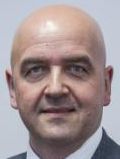
Le Tocq |
Le Sueur, Terry, byname of Terence Augustine Le Sueur (b. 1942?), chief minister of Jersey (2008-11).
Le Theule, Joël (b. March 22, 1930, Sablé-sur-Sarthe, Sarthe, France - d. Dec. 14, 1980, Saint-Brice, Mayenne, France), French defense minister (1980). He was also minister of overseas departments and territories (1968) and transports (1978-80).
Le Tocq, Jonathan (Paul) (b. March 1964), chief minister (2014-16) and external affairs minister (2016- ) of Guernsey.
Le Troquer, André (Lucien Alexandre) (b. Oct. 27, 1884, Paris, France - d. Nov. 11, 1963, Andilly, Seine-et-Oise [now in Val-d'Oise], France), Free French commissioner for war and air (1943-44) and French interior minister (1946) and defense minister (1946-47). He was also president of the National Assembly (1954-55, 1956-58).
Le Van Bang (b. June 30, 1947, Ninh Binh province, North Vietnam), Vietnamese diplomat. He was acting permanent representative to the United Nations (1993-95) and chargé d'affaires (1995-97) and ambassador (1997-2001) to the United States.

Le Vern |
Le Vern, Alain (b. May 8, 1948, Portsall, Finistère, France), president of the Regional Council of Haute-Normandie (1998-2013).
Lea, Albert M(iller) (b. July 23, 1808, Richland, Tenn. - d. Jan. 15, 1891, Corsicana, Texas), acting U.S. secretary of war (1841). The town of Albert Lea, Minn., is named after him.
Lea, Preston (b. Nov. 12, 1841, Wilmington, Del. - d. Dec. 4, 1916, New Castle, Del.), governor of Delaware (1905-09).
Leader, George M(ichael) (b. Jan. 17, 1918, near York, Pa. - d. May 9, 2013, Hershey, Pa.), governor of Pennsylvania (1955-59).
Leahy, William D(aniel) (b. May 6, 1875, Hampton, Iowa - d. July 20, 1959, Bethesda, Md.), U.S. chief of naval operations (1937-39) and chief of staff to the commander in chief (1942-49) and governor of Puerto Rico (1939-40). He was also ambassador to France (1940-42).
Leakin, Sheppard C(hurch) (b. 1790 - d. Nov. 20, 1867), mayor of Baltimore (1838-40).
Leal, Aurelino de Araújo (b. Aug. 4, 1877, Rio de Contas, Bahia, Brazil - d. June 8, 1924, Rio de Janeiro, Brazil), federal interventor in Rio de Janeiro (1923).
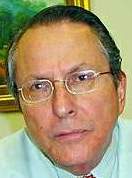
E. Leal |
Leal (Sánchez), Ernesto (José) (b. July 28, 1945, Managua, Nicaragua - d. Dec. 26, 2005, Miami, Fla.), foreign minister of Nicaragua (1992-97). He was also secretary-general of the Central American Integration System (1997-2000).
Leal, Felippe José Pereira (b. Aug. 27, 1812, Rio de Janeiro, Brazil - d. Aug. 13, 1880, São Salvador da Bahia [now Salvador], Brazil), president of Espírito Santo (1849-51). He was also Brazilian chargé d'affaires in the United States (1847-49), Paraguay (1852-55), Venezuela, New Granada, and Ecuador (1855-59), Spain (1859-61), Chile (1861-62), and Italy (1862-63) and minister to Argentina (1863-67), Venezuela (1867-69), Peru (1869-75), Paraguay (1875-76), and Chile (1876-78).
Leal, Francisco Adalberto de Oliveira Barros (b. Jan. 23, 1925, Baturité, Ceará, Brazil - d. Dec. 22, 1995), acting governor of Ceará (1994).
Leal, Francisco Pinto da Cunha (b. Aug. 22, 1888, Pedrógão, Penamacor concelho, Castelo Branco district, Portugal - d. April 26, 1970, Lisbon, Portugal), finance minister (1920-21, 1923) and prime minister and interior minister (1921-22) of Portugal.
Leal, João da Silva (b. Sept. 10, 1879, Jucás, Ceará, Brazil - d. Jan. 29, 1963, Rio de Janeiro, Brazil), acting federal interventor in Ceará (1931).
Leal, João de Deus Pires (b. Jan. 22, 1890, São Bernardo, Maranhão, Brazil - d. May 24, 1975, Teresina, Piauí, Brazil), governor of Piauí (1928-30).
Leal, Luiz Francisco da Camara (b. July 27, 1822, Rio de Janeiro, Brazil - d. Dec. 6, 1878, Ouro Preto, Minas Gerais, Brazil), acting president of Paraná (1859).
Leal, Newton Estillac (b. Aug. 6, 1893, Rio de Janeiro, Brazil - d. May 1, 1955, Rio de Janeiro), war minister of Brazil (1951-52).
Leal, Paulo Nunes (b. July 1, 1916, Carangola, Minas Gerais, Brazil - d. April 27, 2003, Rio de Janeiro, Brazil), governor of Guaporé/Rondônia (1954-55, 1958-61).
Leal, Walfredo Soares dos Santos (b. Feb. 21, 1855, Areia, Paraíba, Brazil - d. June 30, 1942, João Pessoa, Paraíba), acting president of Paraíba (1905-08).
Lealofi, Tupua Tamasese, IV (b. May 8, 1922, Apia, Samoa - d. July 1, 1983), prime minister of Western Samoa (1970-73, 1975-76).
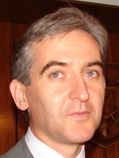
Leanca | 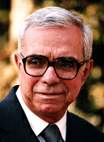
J.G. Leandro |
Leanca, Iurie (b. Oct. 20, 1963, Chimishliya, Moldavian S.S.R. [now Cimislia, Moldova]), foreign minister (2001 [acting], 2009-13) and prime minister (2013-15) of Moldova. He was also a minor presidential candidate (2016) and deputy prime minister for European integration (2018-19).
Leandro, José (Eduardo Martinho) Garcia (b. 1940?, Luanda, Angola), governor of Macau (1974-79).
Leandro Mora, Reinaldo (b. May 23, 1920, La Guaira, Venezuela - d. Nov. 4, 2013, Caracas, Venezuela), interior minister of Venezuela (1966-69). He was also education minister (1961-64), ambassador to the Vatican (1964-66), and president of Congress (1984-89).
Leanza, Vincenzo (b. Dec. 3, 1932, Cesarò, Sicilia, Italy - d. April 7, 2004, Palermo, Sicilia), president of Sicilia (1991-92, 2000-01).
Leão, Agostinho Ermelino de (b. March 25, 1834, Paranaguá, São Paulo [now in Paraná], Brazil - d. June 28, 1901, Curitiba, Paraná), acting president of Paraná (1866, 1869, 1870, 1875).
Leão, Antonio da Rocha Fernandes (b. 1840 - d. June 16?, 1909, Sapucaia, Rio de Janeiro, Brazil), president of Rio de Janeiro (1886-88).
Leão, Humberto de Areia (b. May 30, 1890, Piauí, Brazil - d. 1957), federal interventor in Piauí (1930-31); son of Raymundo de Arêa Leão; brother-in-law of Matias Olímpio de Melo.
Leão, Joaquim Antão Fernandes (b. Jan. 17, 1809, Queluz [now Conselheiro Lafaiete], Minas Gerais, Brazil - d. April 11, 1887), president of Rio Grande do Sul (1859-61) and Bahia (1861-62). He was also Brazilian minister of navy (1848) and agriculture, commerce, and public works (1868-70).
Leão, Manoel do Rego Barros Souza (b. June 7, 1840, Pernambuco province [now state], Brazil - d. July 31, 1882, Recife, Pernambuco), president of Piauí (1870-72).
Leão, Polycarpo Lopes de (b. Feb. 26, 1814, São Salvador da Bahia [now Salvador], Bahia, Brazil - d. Sept. 4, 1882, São Luís, Maranhão, Brazil), president of São Paulo (1860) and Rio de Janeiro (1863-64).
Leão, Raymundo de Arêa (b. May 7, 1846, Taboca [now part of Alto Longá], Piauí, Brazil - d. Jan. 10, 1904, Rio de Janeiro, Brazil), acting president of Piauí (1885).
Leary, Richard P(hillips) (b. Nov. 3, 1842, Baltimore, Md. - d. Dec. 27, 1901, Chelsea, Mass.), governor of Guam (1899-1900).
Leather, Sir Edwin (Hartley Cameron), byname Ted Leather (b. May 22, 1919, Toronto, Ont. - d. April 5, 2005, Paget, Bermuda), governor of Bermuda (1973-77); knighted 1962.
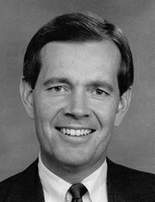
Leavitt |
Leavitt, Mike, byname of Michael Okerlund Leavitt (b. Feb. 11, 1951, Cedar City, Utah), governor of Utah (1993-2003). A Republican, he managed the campaigns of two-term governor Norman Bangerter and Sen. Jake Garn. Leavitt won the 1992 Republican convention and primary 56%-44% over Richard Eyre, who backed a $1,200 school choice voucher. Leavitt had his own Strategic Plan for Education reform plan and opposed vouchers. In the general, liberal Democrat Stewart Hanson ran third, with only 23%; second was explosives manufacturer and anti-tax crusader Merrill Cook, with 34%; Leavitt won with 42%. "The foundation of prosperity is goodness not government," Leavitt said in his 1995 State of the State address. He called for tax cuts, but also wanted to build new highways and spend money on schools in poor areas, to cope with Utah's growth and its small criminal underclass. He pushed activist programs with catchy labels, like the 1994 Healthprint insurance reforms and a $120 million, seven-year Technology 2000 initiative. Leavitt, chairman of the Republican Governors Association in 1995, was a strong partisan of balancing the federal budget and devolving powers to the states. With a healthy state economy and the state's Republican proclivities, Leavitt was reelected in 1996, defeating former Salt Lake City commissioner Jim Bradley 75%-23%. But as the 2000 election approached he was embroiled in controversy, often with members of his own party; his moderate gun-control measures infuriated conservatives and he also vetoed a bill substituting abstinence advocacy for sex education. He defeated Glen Davis in the Republican primary and then won 56%-42% over Democrat William H. Orton. In 2003-05 he was administrator of the Environmental Protection Agency, and in 2005-09 secretary of health and human services.
Lebatt, Mohamed El Hacen Ould, foreign minister of Mauritania (1997-98). He was also ambassador to Ethiopia (2003-05) and South Africa (2005-07).
Lebeau, (Jean Louis) Joseph (b. Jan. 3, 1794, Huy [now in Liège province, Belgium] - d. March 19, 1865, Huy), cabinet chief of Belgium (1832-34, 1840-41). He was also foreign minister (1831, 1840-41), justice minister (1832-34), governor of Namur (1834-40), and minister to the German Confederation (1839-40).
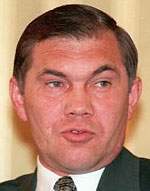
Aleksandr Lebed |
Lebed, Aleksandr (Ivanovich) (b. April 20, 1950, Novocherkassk, Rostov oblast, Russian S.F.S.R. - d. April 28, 2002, Abakan, Khakassia, Russia), Russian politician. In 1981-82 he commanded a paratroop battalion in Afghanistan, for which he was decorated as a Hero of the Soviet Union. He later became a critic of the Afghan war. In 1991, he refused to lead his troops against Russian president Boris Yeltsin during the attempted coup against Soviet Pres. Mikhail Gorbachev. In 1992 he was made commander of the Russian 14th Army, stationed in the Transdniester area of Moldova in support of ethnic Russians there. In 1995, after he had denounced Defense Minister Pavel Grachev's policies, Lieutenant General Lebed was forced to resign from the army. He won a seat in the Russian parliament in the December 1995 elections. In 1996 he campaigned for the presidency; his authoritarian, sometimes anti-West rhetoric appealed to many Russians, and he ran a strong third in the first round (June 16), winning 14.5% of the votes. On June 18, Yeltsin named him secretary of the Security Council and national security adviser. Thus co-opting his support, Yeltsin was able to win the second round of presidential voting against the Communist candidate. A number of top-ranking military officials (including Grachev) were fired, and in August he was handed responsibility for dealing with the situation in Chechnya. He met with both the Chechen separatists and the Russian military commanders, and by the end of the month he had negotiated a ceasefire. On October 17 Yeltsin dismissed Lebed again, saying that he was not a team player. In May 1998 he was elected governor of Krasnoyarsk kray. He died after his Mi-8 helicopter crashed near Abakan after it hit a power line.
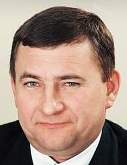
Aleksey Lebed |
Lebed, Aleksey (Ivanovich) (b. April 14, 1955 - d. April 27, 2019, Moscow, Russia), chairman of the government of Khakassia (1997-2009); brother of Aleksandr Lebed.
Lebedev, Pavlo (Valentynovych) (b. July 12, 1962, Novomikhailovsky, Krasnodar kray, Russian S.F.S.R.), defense minister of Ukraine (2012-14).
Lebedev, Sergey (Nikolayevich) (b. April 9, 1948, Uzbek S.S.R.), director of the External Intelligence Service of Russia (2000-07) and executive secretary of the Commonwealth of Independent States (2007- ).
Lebedev, Yury (Isakovich) (b. June 30, 1951), acting governor of Nizhny Novgorod oblast (1997). He was also mayor of Nizhny Novgorod (1998-2002).
Leber, Georg (b. Oct. 7, 1920, Obertiefenbach, Prussia [now part of Beselich, Hessen], Germany - d. Aug. 21, 2012, Schönau am Königssee, Bayern, Germany), defense minister of West Germany (1972-78). He was also minister of transportation (1966-72) and post and communications (1969-72).
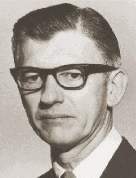
W. Leber |
Leber, Walter P(hilip) (b. Sept. 12, 1918, St. Louis, Mo. - d. Aug. 3, 2009, Palm City, Fla.), governor of the Panama Canal Zone (1967-71). He was commissioned second lieutenant, U.S. Army, in 1941, and advanced through grades to major general in 1967. He was assigned to the Office of the Chief Engineer and advanced to Secretary of Communication Zone, European Theater of Operation, from 1942 to 1946. He was appointed at the Manhattan Engineer District at Oak Ridge from 1946 to 1947, assigned Chief of Technical Division of Military Liaison Command from 1947 to 1949, assistant district engineer of the Executive Officer at Seattle and Walla Walla district from 1949 to 1950, assigned general staff of logistics department of the Army from 1951 to 1955, and was engineer of the 8th U.S. Army in Korea from 1956 to 1957. Leber was appointed executive officer of the Office of the Chief Engineer of the U.S. Army from 1958 to 1961. He was lieutenant governor of the Panama Canal Company from 1961 to 1963, assigned division engineer of the Army Engineer Division in Ohio River from 1963 to 1966, and was director of civil engineering at the Office of Chief Engineer of the U.S. Army in Washington from 1966 to 1967. Under his tenure as governor of the Panama Canal Zone, the studies of the Interoceanic Canal were initiated in 1970 to determine the feasibility for the construction of a sea-level canal; and the completion of the Gaillard Cut widening program in 1970 marked the end of a major improvement project designed to provide safer transit through the Canal. After his term as governor, Leber went to the United States Safeguard anti-ballistic missile system in Washington, D.C.
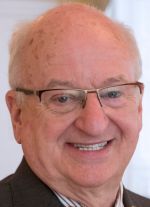
A.J. LeBlanc |
LeBlanc, Arthur Joseph (b. 1943, West Arichat, N.S.), lieutenant governor of Nova Scotia (2017- ).
LeBlanc, Edward Oliver (b. Oct. 3, 1923, Vieille Case, Dominica - d. Oct. 29, 2004, Vieille Case), chief minister (1961-67) and premier (1967-74) of Dominica. He joined the Dominica Labour Party in 1957. He was also a member of the Trinidad-based government of the Federation of the West Indies in 1960 and was first elected to the Dominica House of Assembly in 1961, as political leader of his party. He became chief minister in the British colony, and when the island was granted internal self-government in 1967, became premier. He championed the cause of the rural poor "little man," a term he often used that has endured as a political catchphrase of the Labour Party. He was the island's only political leader to have contested three elections in three different constituencies and won. Some mused that if he "dressed up a broomstick" and asked voters to vote for that broomstick, they would. To the surprise of many, he retired in 1974 at age 50. He gave no reason and took no further part in public life and refused to give interviews.
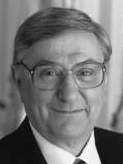
R. LeBlanc |
LeBlanc, Roméo (Adrien) (b. Dec. 18, 1927, L'Anse-aux-Cormier, Memramcook, N.B. - d. June 24, 2009, Grande Digue, N.B.), governor general of Canada (1995-99). He served as press secretary to Lester B. Pearson in 1967-68 and to Pierre Elliott Trudeau in 1968-71. First elected to the House of Commons in 1972 representing Westmorland-Kent, N.B., LeBlanc served for ten years as a minister of the crown. He held the portfolios of minister of state (fisheries) (1974-76), minister of fisheries and the environment (1976-79), minister of fisheries and oceans (1980-82), and minister of public works and minister responsible for the Canada Mortgage and Housing Corporation and the National Capital Commission (1982-84). Between 1974 and 1984, he made official visits to the U.S.S.R. (twice), Poland, Cuba, the EEC, the United Kingdom, and France. He was also a member of the delegation to the United Nations Law of the Sea Conference from 1974 to 1979. In addition, LeBlanc served on the following cabinet committees: External Affairs and Economic Affairs (1974-82); Communications (1974-84; chairman 1976-81); Priorities and Planning (1975-84); and Social Affairs (1982-84). LeBlanc was summoned to the Senate of Canada on June 29, 1984. While a senator, he was a member of the Canada-France Parliamentary Association and the International Association of French-speaking Parliamentarians. He also served on the following Senate committees: Internal Economy, Budgets and Administration (1984-93; chairman 1989-93); Foreign Affairs (1986-94); and the Sub-Committee on Security and National Defence (1992-94). He was appointed speaker of the Senate on Dec. 7, 1993. In 1995 he became Canada's 25th governor general. He was the first person from Canada's Atlantic Provinces and the first Acadian to hold the post.
Leboeuf, Edmond (b. Dec. 5, 1809, Paris, France - d. June 7, 1888, Bailleul, Orne, France), war minister of France (1869-70).
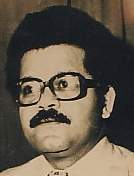
Lebouder |
Lebouder, Jean-Pierre (b. 1944), prime minister (1980-81) and finance minister (2003-04) of the Central African Republic. He was also minister of agriculture and tourism (1976-78) and planning, statistics, and cooperation (1978-80).
Lebranchu, Marylise, née Perrault (b. April 25, 1947, Loudéac, Côtes-du-Nord [now Côtes-d'Armor], France), justice minister of France (2000-02). She was also minister of civil service, reform of the state, and decentralization (2012-16).
Lebret, Georges (b. Nov. 7, 1853, Etampes, Seine-et-Oise [now in Essonne], France - d. Jan. 17, 1927, Paris, France), justice minister of France (1898-99). He was also mayor of Caen (1892-96).
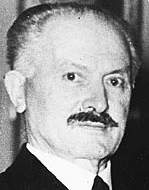
Lebrun |
Lebrun, Albert (François) (b. Aug. 29, 1871, Mercy-le-Haut, Meurthe-et-Moselle, France - d. March 6, 1950, Paris, France), president of France (1932-40). He was elected deputy from Meurthe-et-Moselle in 1900, and in 1905 became president of his departmental conseil général, retaining this office until 1932. He was minister of colonies (1911-13, 1913-14), war (1913), blockade (1917-18), and liberated regions (1917-19). He was made senator in 1920 and was vice president (1925-29) and president (1931-32) of the Senate. A moderate conservative, he was elected president of the republic on May 10, 1932, largely as a compromise candidate acceptable to all factions. In his role as mediator and as a symbol of unity, he easily adapted to governments of both the right and the left, rarely exerting political influence on cabinet appointments or policy. On April 15, 1939, he was reelected (sharing this distinction with only one other Third Republic president, Jules Grévy). When Germany successfully invaded France early in World War II, he was among those who urged the removal of the government to North Africa but ultimately complied with the cabinet's decisions of June 1940 that led to the armistice with Germany. When, at Vichy on July 10, 1940, the National Assembly by 569 votes to 80, with 18 abstentions, accorded full powers to Marshal Philippe Pétain, who on the following day, by a sort of coup d'état, proclaimed himself chief of state, Lebrun, without resigning formally, and without protest, retired to Vizille near Grenoble. In 1943 he was interned by the Germans at Itter in Tirol. As the Allies liberated France in 1944, he acknowledged Gen. Charles de Gaulle as head of the provisional government, ending his own political career.
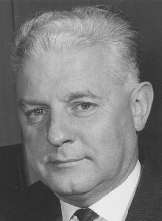
Leburton |
Leburton, Edmond (Jules Isidore) (b. April 18, 1915, Lantremange, near Waremme, Liège province, Belgium - d. June 15, 1997, Waremme), prime minister of Belgium (1973-74). He was also minister of public health and family (1954-58), social security (1961-65), and economic affairs (1969-71) and chairman of the Chamber of Representatives (1977-79). During his tenure as prime minister the government was scandal-ridden; he was the last Socialist to hold the office until 2011.
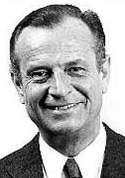
Lecanuet |
Lecanuet, Jean (Adrien François) (b. March 4, 1920, Rouen, Seine-Inférieure [now Seine-Maritime], France - d. Feb. 22, 1993, Neuilly-sur-Seine, Hauts-de-Seine, France), French politician. During World War II he fought with the Resistance. He was elected to the National Assembly in 1951 and spent most of the remainder of his life as an elected official there (1951-55, 1973-74) or in the Senate (1959-73, 1977-93). He was a little-known figure from Normandy when he challenged Pres. Charles de Gaulle in France's first direct presidential election in 1965. Although Lecanuet, representing the centrist Popular Republican Movement (MRP), came in third with only 15.6% of the vote, he infuriated Gaullists by forcing an unexpected runoff between the formerly invincible de Gaulle and the Socialist candidate, François Mitterrand. His high-profile campaign drew considerable attention and he was credited with triggering the runoff by drawing votes from traditional de Gaulle supporters. A lifelong devotee of European unity and trans-Atlantic cooperation, he emerged as an influential political moderate, serving as president of the MRP (1963-65), the Democratic Centre Party (1966-76), the Centre for Social Democrats (1976-82), and the centre-right Union for French Democracy (1978-88). He was minister of justice (1974-76) and plan (1976-77). He also served in the European Parliament (1979-88) and was mayor of Rouen (1968-93) and president of the Regional Council of Haute-Normandie (1974).
Lecca, Dimitrie (b. Dec. 2, 1832, Tecuci, Moldavia [now in Romania] - d. July 4, 1888, Radomiresti, Bacau county, Romania), war minister of Romania (1866, 1879-80). He was also chairman of the Assembly of Deputies (1882-83, 1883-88).
Léchelle, Honoré (Henry) (b. March 27, 1827, Fort-de-France, Martinique - d. ...), commandant of Nossi-Bé (1873-74).
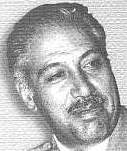
Lechín |
Lechín Oquendo, Juan, byname El Maestro (b. May 19, 1912, Corocoro, La Paz department, Bolivia - d. Aug. 27, 2001, La Paz, Bolivia), Bolivian labour leader. He worked as a driller in the mines, gained fame as a skilled soccer player and, according to both his detractors and admirers, was a legendary womanizer and a Machiavellian leader. Upon his father's request, he studied in the American School of La Paz, where he met Hernán Siles Zuazo and Rafael Otazo, who later invited him to join Gualberto Villarroel's government in 1943. "Doctor Siles called me when they were handing out the government jobs and told me, 'Juan, you're going to start out high up, as the Director of Industry and Commerce,'" Lechín recalled. Despite this opportunity, Lechín requested instead to be appointed sub-prefect of Uncía, Potosí; it was more important than other sub-prefect positions because Catavi was then the economic centre of the country. Soon after assuming his position, Lechín established close relationships with miners and advocated the legal formation of their union. At the first meeting of the Bolivian Miners' Federation on June 11, 1944, he was named permanent secretary. From that date onwards he remained at the forefront of the workers' movement, a period of four decades in which he also was minister of mines and petroleum (1952-54), vice president (1960-64), and ambassador to Italy (1962-63) and presided over the "Popular Assembly" created in May 1971. He was arrested, confined, and exiled almost as many times as he enjoyed power. From 1971 to 1978, he headed the "black list" of then dictator Hugo Banzer's opponents and was not allowed to enter the country. He was a minor presidential candidate in 1980. In 2000 Banzer, as a democratic president, granted him with the Condor de Los Andes medal, the highest honour a citizen can receive from the state.
Lechuga Hevia, Carlos (b. Feb. 28, 1918, Havana, Cuba - d. April 1, 2009, Havana), Cuban diplomat. He was ambassador to Chile (1959), Mexico (1962), and Portugal (1981-83) and permanent representative to the United Nations (1962-66).

C.V.E. Leclerc |
Leclerc, Charles Victor Emmanuel (b. March 17, 1772, Pontoise [now in Val-d'Oise département], France - d. Nov. 2, 1802, Cap-Français, Saint-Domingue [now Cap-Haïtien, Haiti]), governor-general of Saint-Domingue (1802); brother-in-law of Napoléon I. He joined the army in 1791 and distinguished himself at the siege of Toulon (1793). It was in this campaign that he met Napoléon, who developed a great affection for him; Leclerc would serve Napoléon faithfully for the rest of his life. He was promoted to general after duty in Napoléon's Italian campaign. The relationship was further strengthened by his marriage (1797) to Napoléon's sister, Pauline. He played a decisive role in the coup of 18 Brumaire (1799) that brought Napoléon to power. He proved his abilities as a general in Germany (1800) and commanded the French expedition to Portugal (1801). Leclerc was then sent by Napoléon to subdue the rebellion in Saint-Domingue. Accompanied by 23,000 French troops, he landed there in February 1802 and soon took possession of most of the island and made peace with the rebel leaders Henry Christophe, Toussaint-Louverture, and Jean-Jacques Dessalines. But he broke the agreement when, on Napoléon's secret instructions, he captured Toussaint-Louverture and sent him to France. This treachery and Napoléon's restoration of slavery on Guadeloupe touched off renewed fighting with the black rebels and at a time when Leclerc's army was decimated by a yellow fever epidemic. Leclerc himself succumbed in November and the blacks then resumed the offensive under Christophe and Dessalines. The French surrendered in November 1803.
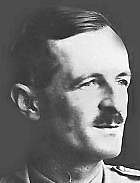
Leclerc de H. |
Leclerc de Hauteclocque, Jacques Philippe (legal name from 1945), original name Philippe Marie, vicomte de Hauteclocque, wartime pseudonym Jacques Philippe Leclerc (b. Nov. 28, 1902, Belloy-Saint-Léonard, Somme, France - d. Nov. 28, 1947, near Colomb-Béchar [now Béchar], Algeria), French general. He passed out of the military school of Saint-Cyr in 1924; his promotion was slow, and on the outbreak of World War II in 1939 he was still a captain. He was wounded and taken prisoner in 1940, but contrived to escape, made his way to England, and offered his services to Gen. Charles de Gaulle. He adopted the name Leclerc to avoid reprisals against his relatives in France. He was sent to the French Cameroons, where he established the Free French regime and displayed brilliant organizing power. His first feat was to capture the Kufra oasis during Sir Archibald Wavell's offensive, but when the British retreated he had to do the same. In 1942-43 he led a French force from Fort-Lamy in Chad to join the British 8th Army in Tripoli, Libya, an achievement which had an immense moral value to France. Returning to England, he raised and trained the famous French 2nd Armoured Division, which took part under his command in the invasion of Normandy and in the liberation of Paris (August 1944). Its troops were the first to enter Strasbourg (Nov. 23, 1944) and for a short time in early 1945 he acted as governor of Strasbourg. Later that year he was appointed commander-in-chief in French Indochina, where his vigorous methods provoked some criticism. In 1946 he was made a full general. He was killed in an aircraft accident in Algeria, where he had held the appointment of inspector-general of the forces. He was created maréchal de France posthumously in 1952.
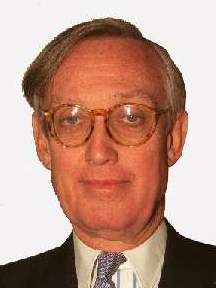
Leclercq |
Leclercq, Patrick (André) (b. Aug. 2, 1938, Lille, France), minister of state of Monaco (2000-05). He was also French ambassador to Jordan (1985-89), Egypt (1991-96), and Spain (1996-2000).
Leclère, Ernest (Georges) (b. April 22, 1865, Luxembourg, Luxembourg - d. May 27, 1938, Luxembourg, Luxembourg), interior minister of Luxembourg (1915).
Leconte, (Jean-Jacques Dessalines Michel) Cincinnatus (b. Sept. 29, 1854, Ouanaminthe, Haiti - d. [killed in an explosion in the National Palace] Aug. 8, 1912, Port-au-Prince, Haiti), president of Haiti (1911-12); great-grandson of Jean-Jacques Dessalines. He was also minister of public works and agriculture (1897-1902).
Leconte (Mantilla), Ricardo (Guillermo) (b. Oct. 23, 1932), governor of Corrientes (1987-91).
Lecourt, Robert (b. Sept. 19, 1908, Pavilly, Seine-Inférieure [now Seine-Maritime], France - d. Aug. 9, 2004, Boulogne-Billancourt, Hauts-de-Seine, France), French justice minister (1948, 1949, 1957-58), deputy prime minister (1949), minister of cooperation (1959-60), and minister of overseas departments and territories and the Sahara (1960-61). He became a member (1962-76) and president (1967-76) of the European Court of Justice.
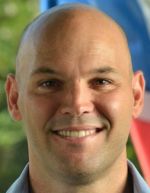
Lédée |
Lédée, Xavier (b. Oct. 15, 1980, Saint-Barthélemy), president of the Territorial Council of Saint-Barthélemy (2022- ).
Lederer, Jirí (b. July 15, 1922, Sollnitz [now part of Dessau-Rosslau, Sachsen-Anhalt], Germany - d. Oct. 12, 1983, Bad Reichenhall, Bayern, West Germany), Czechoslovak dissident. Both of his parents died in Nazi concentration camps. He was himself incarcerated in a camp in Poland, but escaped and remained in hiding in Poland until the end of World War II. On his return to Czechoslovakia he joined the Social Democratic Party. Being on the party's left wing, he favoured the merger with the Communist Party, which he joined in 1948. Three years later he was expelled from the Writers' Union, and until 1968 he worked in factories and as a free-lance journalist, with brief periods on the staff of Literarny Noviny. In 1968 he joined Literarny Listy and became nationally known during the reformist Prague Spring period. After the Soviet invasion in August that year, he became a leading figure of the opposition, helping to organize passive resistance. In January 1970 he was arrested and held for two months. A series of articles on anti-Semitism in Poland led to another imprisonment in 1972. He was sentenced to two years but was released after one. In 1977 he was sentenced to a three-year term in prison as one of the signatories of the Charter 77 human rights document. On his release he was allowed to emigrate to West Germany with his family (September 1980).
Ledesma (Izquieta), Genaro (Alfonso) (b. Sept. 19, 1931, Cajabamba, Cajamarca, Peru - d. April 1, 2018, Lima, Peru), Peruvian politician. He was founder of the Popular Front of Workers, Peasants, and Students (1977) and a minor presidential candidate (1980).
Ledesma (Ginatta), Xavier (Emilio) (b. 1949? - d. Oct. 9, 2018), interior minister of Ecuador (1995-96, 2005).
Ledesma Abdala (de Zamora), Claudia (Alejandra) (b. September 1974, La Banda, Santiago del Estero, Argentina), governor of Santiago del Estero (2013-17); wife of Gerardo Zamora. She became provisional president of the Senate in 2019.
Ledesma Bartret, Fernando (b. Dec. 30, 1939, Toledo, Spain), justice minister of Spain (1982-88). He was also president of the Council of State (1991-96).
Ledesma Rebaza, Walter (b. July 29, 1943, Huamachuco, La Libertad, Peru), defense minister of Peru (2000-01).
Ledezma Cornejo, Jorge (b. Aug. 24, 1963, Melga, Sacaba, Cochabamba, Bolivia), interim prefect of Cochabamba (2008-10) and defense minister of Bolivia (2015). He was also ambassador to Peru (2011-15).
Ledru-Rollin, Alexandre Auguste (b. Feb. 2, 1807, Paris, France - d. Dec. 31, 1874, Fontenay-aux-Roses, Seine [now in Hauts-de-Seine], France), interior minister of France (1848).
Lee, Anthony (C.W.) (b. 1923? - d. Jan. 21, 2017), commissioner of Anguilla (1968-69, 1969).
Lee, Charles (b. 1758, Westmoreland county, Virginia [now in U.S.] - d. June 24, 1815, Fauquier county, Va., U.S.), U.S. attorney general (1795-1801) and acting secretary of state (1800); brother of Henry Lee.
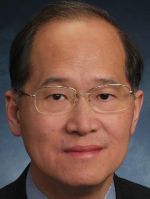
D. Lee |
Lee, David (Tawei) (Lee Ta-wei) (b. Oct. 15, 1949, Taipei, Taiwan), foreign minister of Taiwan (2016-18). He was also representative in the European Union (2001-04), the United States (2004-07), Canada (2007-12), and Australia (2015-16).
Lee, Edwin M(ah) (b. May 5, 1952, Seattle, Wash. - d. Dec. 12, 2017, San Francisco, Calif.), mayor of San Francisco (2011-17).
Lee, Ernest Page (b. 1862, Teignmouth, England - d. Feb. 18, 1932, Queenstown, New Zealand), foreign minister of New Zealand (1920-23). He was also minister of justice (1920-23) and industries and commerce (1920-23).
Lee, Fitzhugh (b. Nov. 19, 1835, Clermont, Fairfax county, Va. - d. April 18, 1905, Washington, D.C.), governor of Virginia (1886-90); grandson of Henry Lee; nephew of Robert E. Lee.
Lee, Henry, byname Light Horse Harry (b. Jan. 29, 1756, Prince William county, Virginia - d. March 25, 1818, Cumberland island, Ga.), governor of Virginia (1791-94).
Lee, Tun Sir Henry Hau Shik (b. Nov. 19, 1901, Hong Kong - d. June 22, 1988, Kuala Lumpur, Malaysia), finance minister of Malaya (1956-59). He was also minister of transport (1955-56). He was knighted in 1957 and awarded the title Tun in 1959.
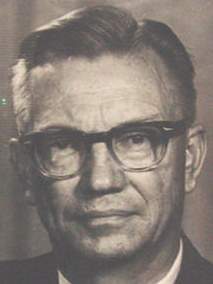
H.R. Lee |
Lee, Hyrum Rex (b. 1910, Rigby, Idaho - d. July 26, 2001, San Diego, Calif.), U.S. administrator. He entered government service in 1936 as an economist with the Department of Agriculture. During World War II, working with the War Relocation Authority, he was assigned to relocate Japanese-Americans. Later, with the Bureau of Indian Affairs, he worked his way up to deputy commissioner, championing legislation to improve the health, welfare, and economic status of American Indians. In 1961 he was appointed governor of a largely undeveloped American Samoa. His appointment signaled a major effort by the U.S. to finance the building of schools, streets, and houses while addressing such problems as rampant illiteracy and dubious health care. Embarking on an intense program of modernization that touched all segments of the territory, Lee ushered in a new era of education and economic vitality. Among his innovations: educational television, implemented in 1964 through his successful appeal for government appropriations. Under Lee's leadership, the American Samoan Development Corporation created a 101-room hotel as part of a campaign to cultivate the tourist industry. A hospital and two tuna processing plants also were built, and the Samoan legislature passed a law in 1963 to institute a federal income tax. In 1966, when American Samoa had the opportunity to reunify with Western Samoa, citizens voted to remain a territory of the United States. Lee received the Award for Distinguished Federal Civilian Service toward the end of his six-year tenure in American Samoa. In 1968 Pres. Lyndon Johnson appointed Lee to the Federal Communications Commission, where he became a leading advocate of public television. He retired in 1973.

J.B. Lee |
Lee, J(oseph) Bracken (b. Jan. 7, 1899, Price, Utah - d. Oct. 20, 1996, Salt Lake City, Utah), governor of Utah (1949-57). A conservative Republican, he was first elected in 1948, defeating Democratic incumbent Herbert Maw in a rematch of a 1944 campaign Lee had lost by just 1,056 votes. His tight control of state spending was credited for funding a $19.5 million surplus by the end of his second term. Lee angered some Mormon Church officials when he lashed out at Pres. Dwight D. Eisenhower's moderate politics. At one point, Lee threatened to form a third party if the Republicans did not repudiate Eisenhower. At the time, Ezra Taft Benson - who later became president of the Church of Jesus Christ of Latter-day Saints - was serving as Eisenhower's agriculture secretary. Lee lost his bid for a third term as governor when he was defeated by George Clyde in the 1956 GOP primaries. He then ran as an independent, but was defeated, along with Democrat L.C. Romney, by Clyde in the general election. He was mayor of Price in 1936 and served as Salt Lake City's mayor from 1960 until his retirement in 1972, gaining a tough reputation for fighting corruption and insisting on bare-bones fiscal policies.
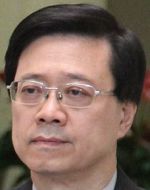
J. Lee | 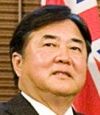
P.S. Lee |
Lee (Ka-chiu), John (b. December 1957, Hong Kong), chief executive of Hong Kong (2022- ). He was also secretary for security (2017-21) and chief secretary for administration (2021-22).
Lee, Philip S(iu Lun) (b. 1944, Hong Kong), lieutenant governor of Manitoba (2009-15). He moved to Winnipeg in 1962 to study chemistry and chose to stay in the country following his studies, becoming a Canadian citizen in 1971.
Lee, Rex (Edwin) (b. Feb. 27, 1935, Los Angeles, Calif. - d. March 11, 1996, Provo, Utah), U.S. solicitor general (1981-85). His son Mike Lee became a Republican U.S. senator from Utah in 2011.
Lee, Robert E(dward) (b. Jan. 19, 1807, Stratford estate, Westmoreland county, Va. - d. Oct. 12, 1870, Lexington, Va.), Confederate general in the American Civil War; son of Henry Lee. He was commander of the Army of Northern Virginia (1861-65), the most successful of the Confederate armies, and became overall commander in February 1865, surrendering in April.
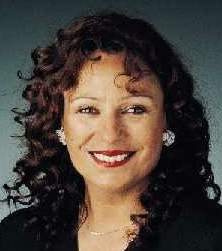
S. Lee |
Lee(-Vercoe), Sandra (Rose Te Hakamatua), née Lee (b. Aug. 8, 1952, Wellington, New Zealand), high commissioner of Niue (2003-05). Before entering the New Zealand parliament in 1993 as MP for Auckland Central, she served on the Auckland city and Waiheke county councils. She was minister of conservation and local government and associate minister of Maori affairs from 1999 to July 2002.
Lee, Thomas Sim (b. Oct. 29, 1745, near Upper Marlboro, Prince George's county, Maryland - d. Nov. 9, 1819, Frederick county, Md.), governor of Maryland (1779-82, 1792-94).
Lee, Sir William (b. Aug. 2, 1688, Hartwell, Buckinghamshire, England - d. April 8, 1754), British acting chancellor of the exchequer (1754); knighted 1737. He was lord chief justice (1737-54).
Lee Bum Suk (Yi Pom Sok) (b. Oct. 20, 1900, Seoul, Korea [now in South Korea] - d. May 11, 1972), prime minister (1948-50), defense minister (1948-49), and home affairs minister (1952) of South Korea. He was also ambassador to Taiwan (1950-51).
Lee Bum Suk (b. Sept. 14, 1925 - d. Oct. 9, 1983, Rangoon, Burma [now Yangon, Myanmar]), foreign minister of South Korea (1982-83). He was also ambassador to Tunisia (1970-71) and India (1976-80) and minister of national unification (1980-82). He was killed in a North Korean bomb attack while on a visit to Burma.

Lee Han Dong |
Lee Han Dong (b. Dec. 5, 1934, Gyeonggi province, Korea [now in South Korea] - d. May 8, 2021), home affairs minister (1988-89) and prime minister (2000-02) of South Korea. He was a presidential candidate in 2002, but won only 0.3% of the vote. In 2004 he was prosecuted on charges of taking illegal campaign funds during the 2002 campaign.
Lee Han Key (b. 1917 - d. Feb. 4, 1995), acting prime minister of South Korea (1987).
Lee Hang, (Tapunuu Papali'i) Niko (b. 1953? - d. Nov. 29, 2022, Apia, Samoa), finance minister of Samoa (2006-11). He was also minister of works, transport, and infrastructure (2016-21).
Lee Ho (b. Feb. 7, 1914, Yongchon, North Kyongsang province, Korea [now in South Korea] - d. May 24, 1997), home affairs minister of South Korea (1960, 1967-68). He was also justice minister (1955-58, 1968-70) and ambassador to Japan (1971-73).
Lee Hong Koo (b. May 9, 1934, Seoul, Korea [now in South Korea]), prime minister of South Korea (1994-95). He was also minister of national unification (1988-90, 1994) and ambassador to the United Kingdom (1991-93) and the United States (1998-2001).
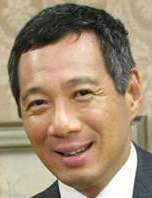
Lee Hsien Loong |
Lee Hsien Loong, Pinyin Li Xianlong (b. Feb. 10, 1952, Singapore), deputy prime minister (1990-2004), finance minister (2001-07), and prime minister (2004- ) of Singapore; son of Lee Kuan Yew. He became an officer in the Singaporean military, rising to the rank of brigadier general and serving as army chief of staff (1982-84), before beginning a political career in 1984 when he joined his father's ruling People's Action Party (PAP). He rose rapidly through the ranks, being appointed minister of state for defense and for trade and industry (1985-86), minister of trade and industry (1986-93), and, when Goh Chok Tong took over the premiership in 1990, deputy prime minister. On May 29, 2004, he was designated by the PAP to succeed Goh as prime minister. Compared with the affable Goh, Lee is seen by the public as tough, conservative, and uncompromising like his father.
Lee Huan, Wade-Giles and Pinyin Li Huan (b. Feb. 8, 1917, Hankow, Hubei [Hupeh] province, China - d. Dec. 2, 2010, Taipei, Taiwan), premier of Taiwan (1989-90). He began working closely with Chiang Ching-kuo in the early 1950s and later took charge of the Youth Corps and the organization and training work of the ruling Kuomintang (KMT). The effort paid handsome dividends, for it produced well-educated future leaders for the party and the government. In the 1970s Lee oversaw the implementation of a reform program, known as Taiwanization (but not localization). Because it emphasized native talents and resources, it led to the appointment of many natives of Taiwan to important positions. These reforms, however, faced a serious setback from growing conservative opposition, especially after the violent Chungli Incident - the 1977 political riots in Chungli that forced Lee's resignation. In 1978 Lee founded National Sun Yat-sen University, which he helped develop into a major institution. His concern for education led to his appointment as education minister in 1984. He soon won popular acclaim for his educational programs and for the respect he accorded intellectuals and educators. In 1987 Lee became one of the most important politicians in Taiwan when he was named secretary-general of the KMT. As Chiang's right-hand man in the KMT's democratic reforms, Lee enjoyed grass-roots support for his pragmatic and rational approach to Taiwan's problems, including challenges from the political opposition in Taiwan and the Communist regime on the mainland.
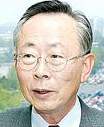
Lee Hun Jai |
Lee Hun Jai (b. April 17, 1944, Shanghai, China), South Korean politician. He began his career in the Ministry of Finance in 1970, where he made his name by helping Korea avoid a foreign currency crisis following the first oil shock of 1973. He held a number of positions in the ministry before taking a break in 1981. He was commissioner of the Securities and Exchange Commission in 1991-96. He became a household name as the country's leading business reform crusader after he was tapped by Pres. Kim Dae Jung in April 1998 to head the newly created Financial Supervisory Commission (FSC), charged with recapitalizing the nation's insolvent banking system and restructuring its bloated corporations. He did so relentlessly, pressuring the powerful chieftains of Korea's gigantic conglomerates, known locally as chaebol, to cut debt, shed units, and adopt professional management practices. By taking control of many of Korea's biggest commercial banks in the recapitalization process, he was able to twist corporate arms by threatening to withhold vitally needed credit lines. The blunt-speaking Lee once said he took his inspiration from Genghis Khan. As head of the new financial regulatory agency, he needed a certain ruthlessness, assuming powers over banks and businesses that were once the reserve of the finance ministry. But President Kim wanted to weaken the ministry and its powerful mandarins upon taking office in February 1998. As a result, the ministry and the regulatory agency were in a barely disguised tussle for power that seemed to be put to rest with Lee's appointment as finance minister in a cabinet reshuffle in early 2000, following the installation of new prime minister Park Tae Joon. When the latter resigned in May 2000, Lee was briefly acting prime minister. He was dismissed as finance minister in August 2000 but held the post again from February 2004 to March 2005, and was again acting prime minister in May-June 2004.
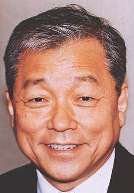
Lee Jong Wook |
Lee Jong Wook (b. April 12, 1945, Seoul, South Korea - d. May 22, 2006, Geneva, Switzerland), director-general of the World Health Organization (2003-06). He worked as a medical officer at the LBJ Tropical Medical Center in American Samoa in 1981-83, then joined WHO as leader of a leprosy-control team for the South Pacific. In 1987-90 he served as a regional adviser for chronic disease, and in 1990 he was named director of WHO's Disease Prevention and Control office in Manila. In 1994 he moved to WHO's Geneva headquarters to direct its global program for vaccines and immunizations. In this post he spearheaded the agency's efforts to combat polio and tuberculosis. In 1998 he became a senior policy adviser to the WHO director-general, and from 2000 he was the director of the agency's Stop TB program, an antituberculosis campaign that involved more than 250 international partners. In January 2003 he was nominated as the next WHO director-general. Although he had worked for the agency for nearly 20 years, he was not widely known in international circles, and in the vote by WHO's executive board he was chosen by a close 17-15 margin over Peter Piot, the Belgian head of the UN's AIDS program; several other prominent candidates, including Mozambican Prime Minister Pascoal Mocumbi, had been eliminated in a preliminary round of voting. After being formally approved by the WHO General Assembly in May, Lee took office and began a five-year term on July 21. Before his election, he had outlined his plans, identifying "poverty and AIDS, conflict and disasters, inequitable distribution of critical resources like food and safe drinking water, and environmental degradation" as the most serious current threats to public health and pledged to devote more resources to countries in which health care systems were facing collapse. He also called for decentralizing WHO in order to improve its effectiveness.

Lee Joung Binn |
Lee Joung Binn (b. Dec. 16, 1937), foreign minister of South Korea (2000-01). He was also ambassador to Nepal (1983-84), Sweden (1986-88), India (1991-94), and Russia (1996-98).
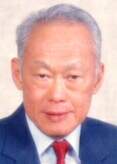
Lee Kuan Yew |
Lee Kuan Yew, Pinyin Li Guangyao, until 1950 Harry Lee Kuan Yew (b. Sept. 16, 1923, Singapore - d. March 23, 2015, Singapore), prime minister of Singapore (1959-90). In 1954 he founded the People's Action Party (PAP). He was elected to parliament in 1955. In 1956 he went to London as a member of a Singaporean delegation that unsuccessfully sought self-rule for the colony. Agreement was reached in 1957 on a measure of self-government. Lee accepted a challenge by his rival David Marshall to hold a by-election on the issue, but Marshall dropped out and Lee won an overwhelming majority. In a brief power struggle within the PAP, he was ousted as secretary-general by the party's left wing in August, but he regained the post in October. In 1958 in London, he helped negotiate for Singapore the status of a self-governing state within the Commonwealth. Elections were held under Singapore's new constitution in May 1959. Lee's party won a decisive victory, and he became prime minister. In 1963 he took Singapore into the newly created Federation of Malaysia. Due to growing tension between Chinese and Malays, Singapore had to leave the federation in 1965. Lee's political dominance was made easier when the main opposition party, the Barisan Sosialis (Socialist Front), decided to boycott parliament from 1966. As a result, the PAP won every seat in parliament in 1968, 1972, 1976, and 1980; in later elections opposition parties managed to win one or two seats. Lee brought his country an efficient administration and spectacular prosperity at the cost of a mildly authoritarian style of government that sometimes infringed on civil liberties. Lee resigned the office of prime minister in 1990, though he remained "senior minister" and (until 1992) the leader of the PAP. In 2004 he became "minister mentor" in the cabinet of his son, Lee Hsien Loong. He retired in 2011.
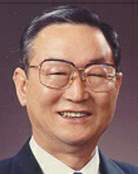
Lee Kyu Sung | 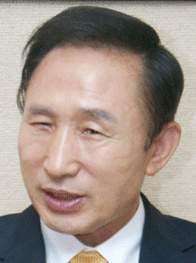
Lee Myung Bak |
Lee Kyu Sung (b. 1939), finance minister of South Korea (1988-90, 1998-99).
Lee Myung Bak, Revised Romanization I Myeong-bak (b. Dec. 19, 1941, Osaka, Japan), president of South Korea (2008-13). He was mayor of Seoul in 2002-06. He was convicted of bribery and embezzlement in 2018 but his 17-year prison sentence was cut short by a presidential pardon in 2022.
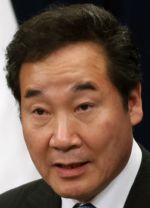
Lee Nak Yon |
Lee Nak Yon (b. Dec. 20, 1952, Yeonggwang, Korea [now in South Korea]), prime minister of South Korea (2017-20). He was governor of South Cholla province in 2014-17.
Lee Sang Ok (b. Aug. 25, 1934), foreign minister of South Korea (1990-93).
Lee See Young (b. Jan. 31, 1937), South Korean diplomat. He was ambassador to Senegal (1985-89) and France (1996-98) and permanent representative to the United Nations (1998-2000).
Lee Soo Young (b. Dec. 28, 1921, Chulsan, Korea [now in South Korea] - d. [suicide] April 21, 1972, Paris, France), South Korean official. He was chargé d'affaires (1956-57) and ambassador (1965-72) to France, permanent observer to the United Nations (1961-64), and minister of public information (1964).
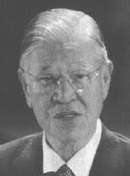
Lee Teng-hui |
Lee Teng-hui, Pinyin Li Denghui (b. Jan. 15, 1923, San-chih, north of Taipei, Taiwan - d. July 30, 2020, Taipei), president of Taiwan (1988-2000). He joined the cabinet in 1972 as minister without portfolio and carried out, as mayor of Taipei (1978-81), such projects as the construction of freeways and reservoirs and the modernization of sewage disposal. As governor of Taiwan province (1981-84) he introduced regional planning and agricultural reforms and contributed to the renovation of rural villages and the construction of irrigation systems. In 1984 he became vice president and in 1988, after the death of Pres. Chiang Ching-kuo, he became the first Taiwan-born president of the Republic of China. He also became acting chairman of the ruling party, the Kuomintang (KMT). His election as KMT chairman at the party's 13th congress in July 1988 further strengthened his position. In 1990 he was reelected by an overwhelming majority of members of the National Assembly, and in 1996 he won Taiwan's first direct popular presidential election. Favouring a policy of "flexible diplomacy" in dealing with the People's Republic of China, he eased restrictions on travel and trade. However, he at first upheld the one-China policy and opposed the independence of Taiwan. He rejected the Chinese Communist formula for reunification - "one country, two systems" - insisting that Taiwan and the mainland should be reunited eventually on the basis of freedom and democracy. In 1999, however, he suggested that Taiwan might consider itself to be an independent nation and not part of China, which strained relations with the mainland. In March 2000, he was forced to resign as head of the KMT after its candidate placed third in presidential elections. In 2001 he broke with the KMT and supported the new Taiwan Solidarity Union.
Lee Tong Won (b. Aug. 2, 1925, Pukchong, Korea [now in North Korea] - d. Nov. 18, 2006, Seoul, South Korea), foreign minister of South Korea (1964-66). He became the chief presidential secretary (the youngest ever) in 1962. He played an important role in reducing tension between Pres. Park Chung Hee and U.S. president John F. Kennedy in 1963 when Seoul declared the extension of military rule by five more years. In 1963-64 he was ambassador to Thailand. As foreign minister, he played a key role in striking an agreement with Japan in 1965 that normalized the two nations' diplomatic relations. He also worked out an agreement with the United States on South Korea's dispatch of troops to Vietnam in 1964. The two agreements succeeded in drawing in financial assistance from Washington and Tokyo that served as seed money for Korea's economic development. In 1967, Lee became a lawmaker for the Democratic Republican Party, which Park created two years after his military coup in 1961. Lee was elected four times as legislator, including the last time in 1996 when he joined hands with Kim Dae Jung, a dissident under the Park regime who became president in 1998.
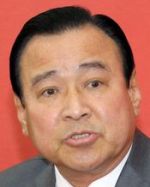
Lee Wan Koo |
Lee Wan Koo (b. June 2, 1950, South Chungchong province, South Korea - d. Oct. 14, 2021), prime minister of South Korea (2015). He was also governor of South Chungchong province (2006-09).
Lee Won Kyung (b. Jan. 15, 1922, Wolsong-gun, Korea [now in South Korea] - d. Aug. 3, 2007), foreign minister of South Korea (1983-86). He was also minister of culture and information (1974-75) and sport (1982-83) and ambassador to Japan (1988-91).
Leeds, Francis Godolphin Osborne, (5th) Duke of, until 1789 styled Marquess of Carmarthen (b. Jan. 29, 1751, Westminster [now part of London], England - d. Jan. 31, 1799, London), British foreign secretary (1783-91). He succeeded as duke in 1789.
Leemhuis-Stout, Joan (Marika) (b. June 29, 1946, Hoogezand, Groningen province, Netherlands), queen's commissioner of Zuid-Holland (1994-99) and acting king's commissioner of Friesland (2016-17).
Leendertse, Antje (b. March 7, 1963, Moers, Nordrhein-Westfalen, West Germany), German diplomat. She has been permanent representative to the United Nations (2021- ).
Lees, Meg (Heather), née Francis (b. Oct. 19, 1948, Burwood, N.S.W.), Australian politician. She joined the Australian Democrats in 1977, the year the party was born, and worked her way up the party ranks. She filled a casual Senate vacancy in 1990 and became party leader in December 1997. In 1998, under her leadership, the party won a record ninth Senate seat, despite her low profile compared to the departed Cheryl Kernot. It was her urging that the party act like a serious negotiating force, and engage in debate with the government and opposition on issues such as the Goods and Services Tax (GST) and Telstra - rather than throw grenades from the sidelines - that got her into trouble. Lees's demise began when she came to the table to thrash out the nuts and bolts of the GST with the government and won the exemption of fresh food, more compensation for pensions, and an environment package, in return for getting the tax through the Senate. Some in her party never forgave her, believing she should have voted against the GST, as did Natasha Stott Despoja, who replaced her as party leader in April 2001. Lees resigned from the party in July 2002 and in April 2003 founded the Australian Progressive Alliance. She lost her Senate seat in the 2004 election.
Leeuwen, Pieter Hendrik van, byname Piet van Leeuwen (b. Oct. 1, 1893, Curaçao - d. ...), administrator of Bonaire (1939-43) and Sint Maarten (1943-48).
Leeuwen, Wilhelmus Frederik van (b. April 18, 1860, Surabaja, Netherlands East Indies [now Surabaya, Indonesia] - d. Sept. 6, 1930, The Hague, Netherlands), queen's commissioner of Noord-Holland (1911-14). He was also mayor of Amsterdam (1901-10).
Lefebvre, Gérard (Serge Roland) (b. May 25, 1930, Poitiers, Vienne, France), prefect of Saint-Pierre and Miquelon (1983-85). He was also prefect of the French départements of Drôme (1986-87) and Tarn (1987-90).
Lefebvre du Prey, Edmond (Joseph Charles Marie) (b. Oct. 16, 1866, Saint-Omer, Pas-de-Calais, France - d. Jan. 14, 1955, Paris, France), justice minister (1924) and foreign minister (1924) of France. He was also minister of agriculture (1921-22).
Lefevre (de la Ossa), Ernesto Tisdel (b. June 30, 1876, Panama City, Colombia [now in Panama] - d. Dec. 24, 1922, Panama City), third vice president (1918-20) and acting president (1920) of Panama.

T. Lefèvre |
Lefèvre, Théo(dore Joseph Albéric Marie) (b. Jan. 17, 1914, Ghent, Belgium - d. Sept. 18, 1973, Woluwé-Saint-Lambert, Belgium), prime minister of Belgium (1961-65). He was also minister without portfolio, in charge of scientific policy and programmes (1968-72).
Lefèvre d'Ormesson, Olivier (Gabriel François-de-Paule) (b. Jan. 3, 1849, Ormesson-sur-Marne, Val-de-Marne, France - d. May 23, 1923, Paris, France), French official. He was prefect of the départements of Allier (1877-79) and Basses-Pyrénées (1879-80), chargé d'affaires in Russia (1886), and minister to Denmark (1894-95), Portugal (1895-97), Greece (1898-1906), and Belgium (1906-09).
Leffingwell, (Shelly) Lee (b. Oct. 13, 1939), mayor of Austin (2009-15).
Lefort, Xavier (b. Jan. 10, 1965), prefect of Guadeloupe (2023- ). He was also prefect of Mayenne département (2021-23).
Lefroy, Sir John Henry (b. Jan. 28, 1817, Ashe, Hampshire, England - d. April 11, 1890, Lewarne, Cornwall, England), governor of Bermuda (1871-77) and acting governor of Tasmania (1880-81); knighted 1877.
Legaré, Hugh S(winton) (b. Jan. 2, 1797, Charleston, S.C. - d. June 20, 1843, Boston, Mass.), U.S. attorney general (1841-43) and acting secretary of state (1843). He was also chargé d'affaires in Belgium (1832-36).
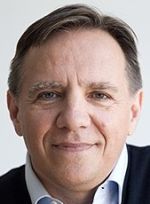
Legault |
Legault, François (b. May 26, 1957, Sainte-Anne-de-Bellevue, Que.), premier of Quebec (2018- ).
Legendre, Jean (Constant) (b. May 7, 1906, Paris, France - d. Sept. 21, 1994, Compiègne, Oise, France), president of the Regional Council of Picardie (1974-76).
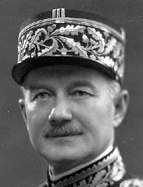
Legentilhomme |
Legentilhomme, Paul (Louis Victor Marie) (b. March 26, 1884, Valognes, Manche, France - d. May 23, 1975, Villefranche-sur-Mer, Alpes-Maritimes, France), governor of Madagascar (1943).
Léger, Adrien (Émile Amédée) (b. May 5, 1899 - d. July 6, 1948), acting governor of French Cameroons (1946) and Chad (1946).
Léger, (Jacques Nicolas Emmanuel) Georges (b. Jan. 27, 1890, Port-au-Prince, Haiti - d. March 26, 1965, Pétionville, Haiti), finance minister (1935-37) and foreign minister (1936-38) of Haiti.
Léger, Jacques (b. May 15, 1914, Port-au-Prince, Haiti - d. October 1980, Port-au-Prince), foreign minister of Haiti (1950-52). He was also chargé d'affaires in Venezuela (1944-47), ambassador to Cuba (1947-48), Argentina and Brazil (1948-50), and the United States and Canada (1952-56), and permanent representative to the United Nations (1956-57).
Léger, Jacques Nicolas (b. March 10, 1859, Les Cayes, Haiti - d. Feb. 5, 1918, Port-au-Prince, Haiti), foreign minister (1911-13) and member of the Council of Secretaries (1912, 1913) of Haiti. He was also minister to the United States (1896-1909).
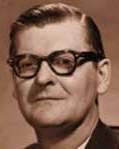
Jules Léger |
Léger, Jules (b. April 4, 1913, Saint-Anicet, Que. - d. Nov. 22, 1980, Ottawa, Ont.), governor general of Canada (1974-79). He joined the External Affairs Department in 1940 and enjoyed a diverse diplomatic career as ambassador to Mexico (1953-54), Italy (1962-64), France (1964-68), Belgium and Luxembourg (1973-74), and the North Atlantic Council and the Organization for European Economic Cooperation in Paris (1958-62). In 1974, he became Canada's 21st governor general. Léger, who suffered a massive stroke less than six months after taking office, relearned English and French, and when he was unable to speak had his wife deliver his speeches. He often said that he had to learn English three times - as a boy from Quebec, on becoming a diplomat, and after his stroke. During his tenure, Léger introduced a new informality to the office by inviting thousands of children to garden parties at his residence and sitting down with 100 children every year for Christmas dinner. He also supervised the transfer from Britain of the power to sign war and peace treaties and accredit diplomats abroad. Undaunted by his illness, Léger remained in office for his full five-year term.
Legge, Henry Bilson (Bilson added in 1754) (b. March 29, 1708 - d. Aug. 23, 1764, Tunbridge Wells, Kent, England), British chancellor of the exchequer (1754-55, 1756-57, 1757-61); son of William Legge, (1st) Earl of Dartmouth.
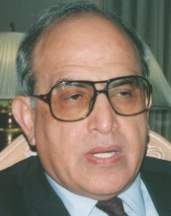
Leghari |
Leghari, (Sardar) Farooq Ahmed (Khan), Urdu (Sardar) Faruq Ahmad (Khan) Leghari (b. May 2, 1940, Dera Ghazi Khan, Punjab province, India [now in central Pakistan] - d. Oct. 20, 2010, Rawalpindi, Pakistan), finance minister (1993), foreign minister (1993), and president (1993-97) of Pakistan. Having joined the Pakistan People's Party (PPP), he won a seat in the Senate in August 1975, where he came to the attention of Prime Minister Zulfikar Ali Bhutto, founder of the PPP. Leghari next gained appointment as minister of production in the Bhutto cabinet, and, in March 1977, he was also elected to the National Assembly. However, Gen. Mohammad Zia-ul-Haq took power in July 1977 and arrested Bhutto, who was executed in 1979. Leghari, meanwhile, remained staunchly loyal to his prime minister and endured four years of prison before being released in 1981. After General Zia died in a plane crash in 1988, democratic rule was reintroduced and Benazir Bhutto, the late prime minister's daughter, won the national election. Leghari won seats in both the National Assembly and the Punjab Assembly, but lost his bid to serve as chief minister of Punjab to Nawaz Sharif of the Pakistan Muslim League (PML). Given Leghari's support of her father, Bhutto assigned him the portfolio of minister of water and power. An internecine power struggle then erupted between Bhutto and Sharif that nearly paralyzed the government over the next two years until Pres. Ghulam Ishaq Khan dismissed Bhutto in 1990. Sharif's party then won a majority in parliament and he became prime minister. For the next two years Leghari assisted Bhutto as deputy leader of the opposition. In April 1993, President Khan stripped Sharif of his office and called for new elections. The PPP secured a slight plurality and Bhutto again became prime minister. Leghari joined her cabinet a second time as finance and then foreign minister, but only briefly before running for the vacated office of president and narrowly defeating Wasim Sajjad of the PML. Despite his long-standing alliance with Bhutto, he was determined to refrain from partisan politics and this was clearly manifested in November 1996 when, citing the corruption of the second Bhutto administration, he dismissed her from office and called for new elections in February 1997, again won by Sharif. Leghari resigned in December after a confrontation with Sharif about Supreme Court appointments.
Légitime, François Denys, byname of François Déus Légitime (b. May 20, 1841, Jérémie, Haiti - d. July 30, 1935), president of Haiti (1888-89). He was also minister of agriculture (1880-81), interior (1881), justice, education, and worship (1881), and foreign affairs (1888).
Legnani (Rodríguez), Augusto (b. March 23, 1912, Montevideo, Uruguay - d. May 15, 1987), interior minister (1967-68) and defense minister (1972) of Uruguay. He was also permanent representative to the United Nations (1969-71).
Legrand, Pierre (b. May 13, 1834, Lille, Nord, France - d. May 31, 1895, Paris, France), French politician. He was prefect of Nord département (1870-71) and commerce minister (1882-83, 1885, 1888-89).
Legros, Auguste (b. Dec. 30, 1922, Saint-André, Réunion - d. May 30, 2008), president of the General Council of Réunion (1982-88). He was also mayor of Saint-Denis (1969-89).
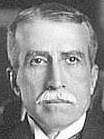
A.B. Leguía |
Leguía (y Salcedo), Augusto B(ernardino) (b. Feb. 19, 1863, Lambayeque, Peru - d. Feb. 6, 1932, Lima, Peru), president of Peru (1908-12, 1919-30); cousin of Eleodoro Romero and Eulogio I. Romero. He was a member of one of the more distinguished families of the Peruvian oligarchy. He entered politics in 1903 when Pres. Manuel Candamo and Prime Minister José Pardo induced him to accept the office of minister of finance. He then also became prime minister (1904-07). He increased the revenue and reestablished Peruvian credit. In 1908 he was elected president for the first time by an alliance of the Civil and Constitutional parties. In 1909 revolutionaries took him prisoner and dragged him to the Plaza de la Inquisición in Lima where he was offered the alternative of death or resignation. It is said that he refused to resign, remaining calm and unmoved. In any case, he was rescued at the last moment by the army. He introduced fiscal and administrative reforms and improved the health-care system by founding hospitals and building drainage systems in the cities. He also resolved the frontier questions with Bolivia and Brazil. For the most part he remained the tool of the Peruvian oligarchy during this term. He spent most of the interval between his two presidential terms in exile in London. He apparently won the 1919 election, but he contended that elements of the old oligarchy were plotting to set aside the results, and his followers staged a coup d'état to install him in office. He broke with the oligarchy that had dominated Peruvian politics for the previous two decades, and he forced many prominent politicians into exile. He presided over the creation of a new constitution, but disregarded constitutional norms and ruled as a dictator. He was removed from office by a coup in 1930 and remained in confinement until his death.
Leguía (y Salcedo), Roberto E(lías) (b. Feb. 16, 1866, Lambayeque, Peru - d. March 19, 1945, Lima, Peru), first vice president of Peru (1912-14); brother of Augusto B. Leguía. He was also president of the Chamber of Deputies (1911-12) and the Senate (1927-30).
Leguía y Martínez, Germán (b. April 30, 1861, Lambayeque, Peru - d. Nov. 21, 1928, Magdalena del Mar, Peru), foreign minister (1911-12, 1920) and prime minister and interior minister (1919-22) of Peru; cousin of Augusto B. Leguía. A noted writer, he was also prefect of Piura (1905-07) and minister to Ecuador (1909-11).
Legwaila, Legwaila Joseph (Manson John) (b. Feb. 2, 1937, Mathathane, Bechuanaland [now Botswana]), Botswanan diplomat. He was permanent representative to the United Nations (1981-99), high commissioner to Guyana (1981-99) and Jamaica (1982-99), and ambassador to Cuba (1983-99).
Lehman, Herbert H(enry) (b. March 28, 1878, New York City - d. Dec. 5, 1963, New York City), governor of New York (1933-42). He was also director-general of the United Nations Relief and Rehabilitation Administration (1943-46) and a Democratic U.S. senator from New York (1949-57).
Lehmann, (Peter Martin) Orla (b. May 19, 1810, Copenhagen, Denmark - d. Sept. 13, 1870, Copenhagen), interior minister of Denmark (1861-63).
Leho, Fatima (b. Sept. 2, 1946, Blagaj, near Mostar [now in Federation of Bosnia and Herzegovina]), governor of Herzegovina-Neretva (1996-97).
Lehr, Robert (b. Aug. 20, 1883, Celle, Prussia [now in Niedersachsen], Germany - d. Oct. 13, 1956, Düsseldorf, West Germany), interior minister of West Germany (1950-53). He was also lord mayor of Düsseldorf (1924-33) and Oberpräsident of Nordrhein (1945-46).
Lehto, Reino (Ragnar) (b. May 2, 1898, Turku, Finland - d. July 13, 1966, Helsinki, Finland), prime minister of Finland (1963-64) and governor of Uusimaa (1964-66).
Lehtosalo, Pauli (b. Dec. 18, 1910, Vehkalahti [now part of Hamina], Finland - d. March 12, 1989, Helsinki, Finland), justice minister of Finland (1961-62). He was also minister of agriculture (1958).
Lei, André Gaudie (b. 17... - d. Sept. 17, 1852, Cuiabá, Mato Grosso, Brazil), acting president of Mato Grosso (1830-31, 1833).
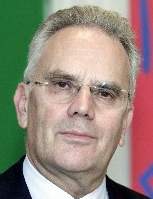
H. Lei |
Lei, Hermann (b. April 25, 1937, Berg, Thurgau, Switzerland), president of the government of Thurgau (1995-96, 1998-99, 2001-02).
Leidenbach, Guillaume (b. 1862? - d. May 8, 1943, Luxembourg, Luxembourg), justice minister of Luxembourg (1921-23).
Leigh, Leslie William, byname Bill Leigh (b. Feb. 23, 1921, Freetown, Sierra Leone - d. April 13, 1980, Monrovia, Liberia), foreign minister of Sierra Leone (1967-68).
Leigh Guzmán, Gustavo (b. Sept. 19, 1920, Santiago, Chile - d. Sept. 29, 1999, Santiago), Chilean junta member. He was commander of the air force on Sept. 11, 1973, the day of the Augusto Pinochet-led coup that toppled Marxist Pres. Salvador Allende. Leigh quickly emerged as the toughest member in the four-man military junta. Just hours after the coup, Leigh vowed the military would "eradicate the Marxist cancer from our fatherland, until the last consequences." It was on his personal orders, he disclosed later, that the air force bombarded and heavily damaged the presidential palace to put down the resistance by Allende and a small group of his followers. A fierce persecution of leftists followed, and Leigh's air force gained a reputation as especially implacable with dissidents. In 1978, Leigh was the first junta member to urge the restoration of civilian rule. That cost him his position with both the junta and the air force. Leigh opposed Pinochet's growing power within the junta. In 1978, when Pinochet called a vote to request that Chileans reject the United Nation's condemnation of the regime's human rights record, Leigh called the move "typical of governments in which power is in the hands of a single dictator." Pinochet believed Leigh wanted to challenge him to lead the country. "Pinochet always felt that I was interested in taking over from him, something that never even entered my mind," Leigh said in one of his last television interviews. In 1990 he was shot by members of an ultra-leftist guerrilla gang; he was hit by five bullets and lost an eye.
Leighton Guzmán, Bernardo (b. Aug. 16, 1909, Nacimiento, Bío-Bío region, Chile - d. Jan. 26, 1995, Santiago, Chile), interior minister of Chile (1964-68). He was also minister of labour (1937-38) and education (1950-52). He was shot and seriously wounded in Rome in 1975; he had consistently denounced Augusto Pinochet's military regime from exile.
Leijon, Anna-Greta, byname of Anna Margareta Maria Lejon (b. June 30, 1939, Stockholm, Sweden), justice minister of Sweden (1983 [acting], 1987-88). She was also minister of immigration (1973-76) and labour (1982-87).
Leijonancker, Fredrik Wilhelm (Erik Carl) (b. March 24, 1818, Falköping, Skaraborg [now in Västra Götaland], Sweden - d. April 16, 1883, Stockholm, Sweden), governor of Halland (1876-83).
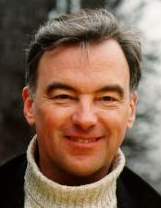
Leijonborg |
Leijonborg, Lars (Erik Ansgar) (b. Nov. 21, 1949, Solna, Stockholm, Sweden), Swedish politician. He was chairman of the youth wing of the Liberal Party (Folkpartiet) in 1971-73. He became a member of parliament in 1985 and was parliamentary leader of the Liberal group in 1990-97. He was Liberal Party chairman in 1997-2007.
Leijonhielm, Anders friherre (b. Jan. 20, 1655 - d. Dec. 27, 1727, Jönköping, Sweden), governor of Östergötland (1714-18) and Jönköping (1718-27). He became friherre (baron) in 1719.
Leijonstedt, Anders greve, originally Anders Volimhaus (b. 1649, Uppsala, Sweden - d. Oct. 10, 1725, Stockholm, Sweden), Swedish diplomat; brother of Jakob greve Gyllenborg; son-in-law of Olof Arvidsson friherre Thegner. He was minister to Prussia (1703-10). He was ennobled under the name Leijonstedt in 1686 and made friherre (baron) in 1716 and greve (count) in 1719.
Leijonstedt, Carl Wilhelm greve (b. Nov. 3, 1725 - d. Nov. 5, 1782, Umeå, Västerbotten, Sweden), governor of Västerbotten (1781-82); nephew of Olof greve Leijonstedt; grandson of Anders greve Leijonstedt.
Leijonstedt, Olof greve (b. June 30, 1691 - d. Feb. 5, 1759, Umeå, Västerbotten, Sweden), governor of Västerbotten (1755-59); son of Anders greve Leijonstedt.
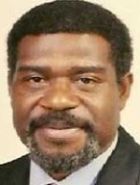
Leingkone |
Leingkone, Bruno (Tao) (b. March 3, 1972), foreign minister of Vanuatu (2016-17). He has also been minister of climate change (2019-22), health (2022), and education (2022- ).
Leino, Yrjö (Kaarlo) (b. Jan. 28, 1897, Helsingfors [now Helsinki], Finland - d. June 28, 1961, Helsinki), interior minister of Finland (1945-48).
Leinonen, Kaarlo (Olavi) (b. March 15, 1914, Tervola, Finland - d. April 19, 1975), defense minister of Finland (1963-64). He was also commander-in-chief of the Defense Forces (1969-74).
Leiro, Lars (b. April 13, 1914, Haus, Søndre Bergenhus amt [now in Vestland fylke], Norway - d. March 22, 2005, Voss, Hordaland [now in Vestland]), governor of Hordaland (1966-84). He was also Norwegian minister of transport and communications (1963).
Leitão, João de Freitas, acting president of Rio Grande do Sul (1889).
Leite, Benedito Pereira (b. Oct. 4, 1857, Rosário, Maranhão, Brazil - d. March 6, 1909, Hyères, Var, France), member of the Governing Junta (1891-92) and president (1906-08) of Maranhão.
Leite, Eduardo Figueiredo Cavalheiro (b. March 10, 1985, Pelotas, Rio Grande do Sul, Brazil), governor of Rio Grande do Sul (2019-22, 2023- ). He was also mayor of Pelotas (2013-17).
Leite, Eraldo Gueiros (b. Jan. 18, 1912, Canhotinho, Pernambuco, Brazil - d. March 5, 1983, Recife, Pernambuco), governor of Pernambuco (1971-75).
Leite, Francisco, Neto (b. March 14, 1907, Riachuelo, Sergipe, Brazil - d. Dec. 10, 1964, Rio de Janeiro, Brazil), federal interventor in Sergipe (1945).
Leite, Isidoro Pedro Leger Pereira, acting governor-general of Angola (1920). He was also Portuguese minister of colonies (1925).
Leite, João Pinto da Costa, conde de Lumbrales (b. Feb. 3, 1905, Porto, Portugal - d. Dec. 31, 1975, Madrid, Spain), finance minister of Portugal (1940-50). He was also minister of commerce and industry (1937-40), public works and communications (1943-44), and the presidency (1950-55) and president of the Corporative Chamber (1955-57).
Leite, José Rollemberg (b. Sept. 19, 1912, Riachuelo, Sergipe, Brazil - d. Oct. 24, 1996, Aracaju, Sergipe), governor of Sergipe (1947-51, 1975-79).
Leite, José Xavier Bressane (b. 1780, Lisbon, Portugal - d. July 10, 1843, Luanda, Angola), governor-general of Angola (1842-43).
Leite, Luiz Benedito Pereira (b. Jan. 21, 1830, Cáceres, Mato Grosso, Brazil - d. Jan. 15, 1910, Cáceres), member of the Governing Junta (1892) and president (1892) of Mato Grosso.
Leith, Sir James (b. Aug. 8, 1763, Leith Hall mansion, near Rhynie, Aberdeenshire, Scotland - d. Oct. 16, 1816, Barbados), governor of the Leeward Islands (1814-16), Barbados (1815-16), and Guadeloupe (1815-16); knighted 1813.
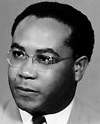
Leito |
Leito, Bernadito M., byname Ben Leito (b. Feb. 6, 1923, Curaçao), governor of the Netherlands Antilles (1970-83). He was the first black in that position.
Leivo, Margus (b. May 28, 1954, Räpina, Estonian S.S.R. - d. Aug. 21, 2019), interior minister of Estonia (2003-05).
Leivo-Larsson, Tyyne (Lilja), original surname Lindroos, later Leivo (b. March 3, 1902, Nykyrka/Uusikirkko, Finland [now Polyany, Leningrad oblast, Russia] - d. Aug. 1, 1977, Helsinki, Finland), Finnish politician. She was second minister of social affairs (1948-50, 1954-57, 1958) and ambassador to Norway (1958-65) and Iceland (1959-65).
Leizaola Sánchez, Jesús María de (b. Sept. 7, 1896, San Sebastián, Spain - d. March 16, 1989, San Sebastián), president of the government of País Vasco in exile (1960-79).

Leka |
Leka (b. April 5, 1939, Tiranë, Albania - d. Nov. 30, 2011, Tiranë), pretender to the Albanian throne. Leka lived abroad since he was three days old. His father, King Zog I, fled Albania with his family when Italian troops invaded. When Zog died in France in 1961, a government in exile swore in Leka as king. In 1975 he married Susan Cullen-Ward (b. Jan. 28, 1941, Waverley, N.S.W., Australia - d. July 17, 2004, Tiranë). The couple lived in Madrid until Spain expelled them when an arms cache was found at their home. He had been arrested earlier in Thailand on charges of arms smuggling. They then went to Rhodesia until the whites lost power. From 1980 they lived in Johannesburg, South Africa, where he was given diplomatic status by the white-minority government and supported himself as a businessman with international connections. They had a son, Leka II (b. 1982). In 1993, Leka tried to enter Albania on an old royal passport, but security forces threw him out after less than 24 hours. He was able to return in April 1997, urging a referendum to let Albanians decide whether they want "a parliamentary monarchy or a republic," adding "the people's choice will be binding on us." Leka said he would be willing to serve his country should Albanians give the monarchy another try. Though he received an enthusiastic welcome, only the small Legality Party openly supported the monarchy. The referendum was held during a general election in June, and only about one-third of the voters supported the restoration of the monarchy. He then went back to South Africa, bitterly complaining that the referendum had been manipulated. He was arrested in February 1999 when police found over 70 firearms along with 14,000 rounds of ammunition, several different kinds of hand grenades, grenade launchers, rocket launchers, and anti-personnel mines on his premises. The couple again returned to Albania in June 2002. On Feb. 2, 2006, he declared that he planned to withdraw from political life and devote himself to the royal family's affairs. He would however remain head of the Movement for National Development which he founded in 2004.
Lekhal, Mohamed Salem Ould (b. Dec. 11, 1952, Atar, Mauritania - d. May 15/16, 2013, Paris, France), foreign minister of Mauritania (1993-96). He was also planning minister (1985-86), economy and finance minister (1986-87), and ambassador to Japan (1989-93) and Belgium (1999-2003).
Lekhanya, Justin Metsing (b. April 7, 1938, Thaba-Tseka, Basutoland [now Lesotho] - d. Jan. 20, 2021, Maseru, Lesotho), chairman of the Military Council and defense minister of Lesotho (1986-91). He was commander of Lesotho's army when he seized power on Jan. 20, 1986, ousting Prime Minister Leabua Jonathan, who had held power since 1965. His action, which received popular support, was prompted by the prime minister's statement that he might turn to the Eastern bloc for arms that he would use against South Africa. Prior to the coup, relations between Lesotho and South Africa had deteriorated, and the latter had imposed border restrictions on Lesotho because of Jonathan's refusal to hand over insurgents belonging to the banned African National Congress, who were alleged to be operating in Lesotho. Jonathan denounced the actions of South Africa, and on January 17 Lekhanya flew to Pretoria as one of a seven-man delegation to persuade the South African government to lift the restrictions. It was suggested that the coup was planned while he was in Pretoria. Following the coup Lekhanya announced that in the future all executive and legislative power would be vested in King Moshoeshoe II - whose powers had been curbed since 1967 - who would select a six-man Military Council, chaired by Lekhanya, that would advise him. All political activity was banned, and a policy of national reconciliation was declared. Lekhanya's main objective was to restore good relations with South Africa, and by January 25 the latter had lifted the restrictions on border traffic that had been crippling Lesotho's economy. On March 26, he also reached an agreement with South Africa on mutual security. It prohibited the use of either country's territory for planning acts of aggression toward the other. In 1990 he lost favour with Lesotho citizens when he was implicated in the death of what many believed to be a rival in a love triangle. In 1991 he was himself ousted in a coup. In 1999 he was elected secretary-general of the opposition Basotho National Party.
Lekic, Danilo (b. 1913, Kralje, Montenegro - d. 1986, Belgrade, Serbia), Yugoslav diplomat. He was ambassador to Brazil (1957-61) and Egypt (1967-69) and permanent representative to the United Nations (1963-67).

Lekishvili |
Lekishvili, Niko(loz Mikheilis dze) (b. April 20, 1947, Tbilisi, Georgian S.S.R.), minister of state of Georgia (1995-98). He was also mayor of Tbilisi (1993-95).
Leko, Josip (b. Sept. 19, 1948, Plavna, Serbia), Croatian politician. He was president of the Sabor (2012-15).
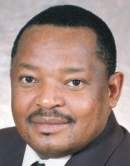
Lekota |
Lekota, Mosiuoa (Gerard Patrick), byname Terror Lekota (b. Aug. 13, 1948, Kroonstad, Orange Free State [now Free State], South Africa), South African politician. He became involved in the South African Students Organization (SASO). At the end of 1973, SASO's full-time organizer Abraham Tiro had to flee the country and Lekota took his place. In September 1974, when SASO began to organize rallies to celebrate the independence of Mozambique, he was arrested, along with eight other SASO leaders, and charged under the Terrorism Act. In the following trial he was sentenced to six years in prison, which he served on Robben Island. He was released at the end of 1982. On the island he shared the company of the imprisoned leaders of the African National Congress (ANC). On Aug. 20, 1983, he attended the national launch of the United Democratic Front and was elected national publicity secretary. Again arrested in April 1985, he was charged with high treason. In November 1988 he was one of four accused found guilty in the "Delmas trial"; he was sentenced to 12 years, but the trialists appealed against their conviction, and in December 1989 they were acquitted. He had spent 4½ years behind bars. After the unbanning of the ANC, he spent time as first chairperson of the Southern Natal region, then chairperson of the Northern Free State region. He was elected to the ANC's National Executive Committee in 1991. He did not get the nickname "Terror" in the political arena as many people think, but on the soccer field. In 1994 he became the first premier of Free State province but was removed from this position in 1996 as a result of party infighting. He was the first chairperson of the new National Council of Provinces, parliament's second house, in 1997-99. In 1999-2008 he was defense minister. In December 2008 he became president of the Congress of the People, a breakaway faction of the ANC.
Lekoundzou Itihi Ossetoumba, Justin (b. 1942, Okouesse village, Boundji district, Middle Congo [now Congo (Brazzaville)] - d. Nov. 25, 2021, Brazzaville, Congo), finance minister of Congo (Brazzaville) (1980-87). He was also minister of industry, mines, and tourism (1971-73) and rural development (1987-89), minister of state for reconstruction and urban development (1997-99), and minister of the presidency in charge of defense (1999-2002).
Lekovic, Jelena, Montenegrin diplomat. She has been chargé d'affaires at the United Nations (2022- ).
Lelashvili, Mikhail (Mikhailovich) (b. 1910, Tiflis, Russia [now Tbilisi, Georgia] - d. ...), Soviet politician. He was mayor of Tbilisi (1949-51), chairman of the Supreme Soviet of the Georgian S.S.R. (1951-52), and first secretary of the Communist Party committee of Tbilisi oblast (1951-52).
Lelikov, Aleksey (Yemelyanovich) (b. Feb. 18 [Feb. 5, O.S.], 1912, Moscow, Russia - d. 1990, Moscow), chairman of the Council of Ministers of the Yakut A.S.S.R. (1965-66).
Lelong, Pierre (b. Jan. 5, 1936, Jérémie, Haiti), Haitian diplomat. He was ambassador to Mexico (1991-96) and permanent representative to the United Nations (1996-2001).
Lely, Cornelis (b. Sept. 23, 1854, Amsterdam, Netherlands - d. Jan. 22, 1929, The Hague, Netherlands), governor-general of Dutch Guiana (1902-05). He was also Dutch minister of water management (1891-94, 1897-1901, 1913-18).
Lema, Salvador Bermúdez de Castro y O'Lawlor, marqués de, duque de Ripalda (b. Nov. 1, 1863, Madrid, Spain - d. Jan. 20, 1945, Madrid), foreign minister of Spain (1913-15, 1917, 1919-21). He was also mayor of Madrid (1903-04). He succeeded as marquess and duke in 1883.
Lema Patiño, Raúl (b. July 21, 1939, La Paz, Bolivia), Bolivian politician; son of Raúl Lema Peláez. He was minister of mining (1972-74) and planning (1978), ambassador to the Soviet Union (1975-78), China (1986-89), and Spain (1994-96), and president of the Senate (1996-97).
Lema Peláez, Raúl (b. Jan. 8, 1910, Tarija, Bolivia - d. 1996), finance minister of Bolivia (1971). He was also president of the Central Bank (1963-64).
Lemaignen, Robert (André François) (b. March 15, 1893, Blois, Loir-et-Cher, France - d. April 3, 1980, Paris, France), French politician. He was European commissioner for overseas development (1958-62).
Lemaire, Bernard (b. Nov. 4, 1946, Vittel, Vosges, France - d. March 6, 2009, Toulouse, France), acting high commissioner of New Caledonia (1986; secretary-general of New Caledonia 1985-87). He was also prefect of the French départements of Haute-Corse (1998-99), Alpes-de-Haute-Provence (1999-2002), Ardennes (2002-04), and Aude (2006-09).
Lemaire, Jean-Baptiste Philémon, also appearing as Philema (or Philima) Lemaire (b. July 7, 1856, Verberie, Oise, France - d. May 6, 1932, Neuilly-sur-Seine, France), chief administrator of Middle Congo (1899-1902), acting commissioner-general of French Congo (1900), and governor of Martinique (1902-04) and French India (1904-05).
Lemaire, Victor (Gabriel) (b. Jan. 3, 1839, Paris, France - d. March 17, 1907), resident-general of Annam-Tonkin (1884-85).
Lemari, Kunio (David) (b. Nov. 29, 1942, Jabor Island, Jaluit Atoll, Marshall Islands - d. late March 2008), acting president of the Marshall Islands (1996-97). He was also minister of justice (1985-88) and transport and communications (1988-2000).

Lemass |
Lemass, Sean F(rancis), Irish Seán Ó Leimeas (b. July 15, 1899, Dublin - d. May 11, 1971, Dublin), prime minister of Ireland (1959-66). He became identified with the Irish revolutionary movement at an early age. During the Easter Rising (April 1916) he served in the garrison at the General Post Office in Dublin; when caught by British soldiers, the story goes that they told him to "go back to mother." His brother Noel died as a revolutionary. After the Anglo-Irish treaty, he threw in his lot with the opponents of the treaty under Eamon de Valera, becoming a member of the headquarters staff of the Irish Republican Army in 1922. He was captured and imprisoned when the Four Courts fell at the beginning of the civil war. He was elected to the Dáil in 1924 but like other members of the anti-treaty block did not take his seat. He shared in the founding of the new party, Fianna Fáil, in 1926. After de Valera rose to the premiership in 1932, Lemass held portfolios in all his cabinets during the next 27 years, as minister of industry and commerce (1932-39, 1941-48, 1951-54, 1957-59), minister of supplies (1939-45), and deputy prime minister (1945-48, 1951-54, 1957-59). When de Valera became president in 1959, Lemass inherited the office of prime minister. Under him the nation took a more outward-looking approach; he improved relations with Northern Ireland, was the prime mover on the Irish side in the establishment of a free trade area between Britain and Ireland (1965), and pressed for Ireland's entry into the European Economic Community (Common Market). Ill health, however, forced him to relinquish the leadership of his party in 1966 and to withdraw from politics in 1969. Ireland's membership in the Common Market was not secured until 1973, after his death.
LeMay, Curtis E(merson) (b. Nov. 15, 1906, Columbus, Ohio - d. Oct. 1, 1990, Riverside county, Calif.), U.S. chief of the Air Force Staff (1961-65). He was the American Independent vice presidential candidate in 1968 (running mate of George C. Wallace).
Lemayev, Vasily (Petrovich) (b. 1902, Novaya Sloboda, Nizhny Novgorod province, Russia - d. ...), first secretary of the Communist Party committee of the North Ossetian A.S.S.R. (1937-38).
Lembo, Cláudio (Salvador) (b. Oct. 12, 1934, São Paulo, Brazil), governor of São Paulo (2006-07).
Leme, Antonio Dias Paes (b. April 2, 1832, Vassouras, Rio de Janeiro, Brazil - d. Jan. 14, 1887, Tavira, Portugal), president of Espírito Santo (1869-70).
Leme, Antonio Pires da Silva Pontes (b. c. 1750, Mariana, Minas Gerais, Brazil - d. April 21, 1805, Rio de Janeiro, Brazil), governor of Espírito Santo (1800-04).
Leme, Ernesto de Moraes (b. Dec. 30, 1896, Bragança [now Bragança Paulista], São Paulo, Brazil - d. May 21, 1986), Brazilian diplomat. He was permanent representative to the United Nations (1954-55).
Lémery, Henry (b. Dec. 9, 1874, Saint-Pierre, Martinique - d. April 26, 1972, Paris, France), justice minister of France (1934). He was also minister of colonies (1940).
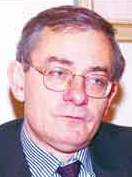
Lemierre |
Lemierre, Jean (b. June 6, 1950, Sainte-Adresse, Seine-Inférieure [now Seine-Maritime], France), president of the European Bank for Reconstruction and Development (2000-08).
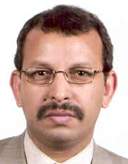
Lemine | 
Lemme |
Lemine, Mohamed Saleck Ould Mohamed (b. 1963, Kiffa, Mauritania), foreign minister of Mauritania (2007-08). He was also ambassador to Switzerland (2006-07).
Lemke (gen. von Soltenitz), Helmut (Bernhard Julius) (b. Sept. 29, 1907, Kiel, Germany - d. April 15, 1990, Lübeck, West Germany), minister-president of Schleswig-Holstein (1963-71).
Lemke, William (b. Aug. 13, 1878, Albany, Minn. - d. May 30, 1950, Fargo, N.D.), U.S. politician. He was a representative from North Dakota (1933-41, 1943-50) and Union Party presidential candidate (1936).
Lemme, (María) Alicia (b. Sept. 19, 1954, Villa Mercedes, San Luis, Argentina), governor of San Luis (2001-03).
Lemne, Mats (Herman) (b. May 20, 1919, Tjällmo, Östergötland, Sweden - d. March 30, 1997), governor of Älvsborg (1955-70) and Södermanland (1970-80). He was also governor of Sveriges Riksbank (1951-55).
Lemon, Idelphonse (William) (b. Nov. 26, 1937, Ouidah, Dahomey [now Benin]), finance minister of Benin (1990-91). He was a minor presidential candidate in 1991.
Lemos, César Tasso Saldanha (b. 1930? - d. Feb. 4, 1979, Fernando de Noronha territory [now part of Pernambuco state], Brazil), governor of Fernando de Noronha (1977-79).
Lemos, Francisco de Faria (b. Dec. 23, 1828, Recife, Pernambuco, Brazil - d. Nov. 7, 1904, Rio de Janeiro, Brazil), president of Pernambuco (1872), Ceará (1876-77), Rio Grande do Sul (1877-78), and Minas Gerais (1886-87).
Lemos, Manuel Pinto de (b. 1823, Vila de São Salvador [now Campos dos Goytacazes], Rio de Janeiro, Brazil - d. Oct. 20, 1899, Florianópolis, Santa Catarina, Brazil), acting president of Santa Catarina (1880, 1883, 1885).
Lemos Simmonds, Carlos (Apolinar) (b. Oct. 23, 1933, Popayán, Cauca department, Colombia - d. July 30, 2003, Bogotá, Colombia), foreign minister (1981-82), interior minister (1989-90), and vice president (1996-98) of Colombia. He was also minister of communications (1989) and ambassador to the U.K. (1995-98).
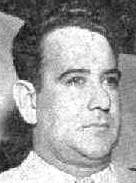
Lemus |
Lemus (López), José María (b. July 22, 1911, La Unión, El Salvador - d. March 31, 1993, San José, Costa Rica), president of El Salvador (1956-60). An army lieutenant colonel, he served as interior minister in 1949-55. As president, he pardoned political prisoners and attempted to continue the progressive programs of his predecessor, Pres. Óscar Osorio. A decline in the prices of coffee and cotton, however, brought strikes, political unrest, and violence. After an attempt was made to assassinate him, Lemus became increasingly harsh and dictatorial. He was deposed in October 1960 by a leftist group and exiled to Costa Rica. In 1992 his two pit bull terriers fatally attacked an elderly man and wounded two others; a judge found him guilty of negligence and fined him about $1,000.
Lenarcic, Janez (b. Nov. 6, 1967, Ljubljana, Slovenia), Slovenian diplomat. He has been EU commissioner for crisis management (2019- ).

Lenárt |
Lenárt, Jozef (b. April 3, 1923, Liptovská Porúbka, Czechoslovakia [now in Slovakia] - d. Feb. 11, 2004, Prague, Czech Republic), prime minister of Czechoslovakia (1963-68). He was a member of the Executive Committee of the Communist Party of Czechoslovakia (1958-68, 1970-89), speaker of the Slovak National Council (1962-63), and first secretary of the Slovak Communist Party (1970-88). In August 1968 he supported the Soviet-led invasion of Czechoslovakia that squelched a popular uprising known as the Prague Spring, and he was the key Communist politician during the so-called "normalization" of the 1970s. After the fall of the Communist regime in 1989 he was forced to resign all his posts and was expelled from the Communist Party. He was charged with treason for allegedly having tried to establish a legal basis for the 1968 invasion. Although Slovak, Lenárt stayed in the Czech Republic after the split of Czechoslovakia and received Czech citizenship. He was acquitted in September 2002.
Lencastre, António de (b. July 11, 1721, Lisbon, Portugal - d. ...), governor of Angola (1772-79).
Lencastre, João de (b. May 3, 1646, Aveiras, Portugal - d. February 1707, Lisbon, Portugal), governor of Angola (1688-91) and governor-general of Brazil (1694-1702).
Lencastre, Júlio Garcês de (b. Aug. 5, 1882, Porto, Portugal - d. March 16, 1970), governor-general of Angola (1934-35).
Lendo, Tahir (b. Feb. 9, 1961, Bistro, near Novi Travnik [now in Federation of Bosnia and Herzegovina]), premier of Central Bosnia (2011- ).
Leng Ngeth (b. 1900, Phnom Penh, Cambodia - d. 19...), prime minister and foreign minister of Cambodia (1955). He was also ambassador to the Soviet Union (1956-57), China (1958-62), and Laos (c. 1963).
Leng Yuqiu (b. 1882, Dantu, Jiangsu, China - d. 1959, Nanjing, Jiangsu), Chinese politician. He joined the Chinese Revolutionary Alliance in 1906, later participating in the anti-Qing uprisings in Anhui as well as Guangdong. As the revolution succeeded in the south, he was named commander of the 3rd, later 9th, Division of the northbound army. He joined the Senate of the Constitutional Junta organized by Sun Yat-sen in 1917. He was also acting interior minister of the southern government. During World War II, he stayed in the Senate, becoming a member of the Standing Committee of the Democratic Alliance of China. After the liberation, he was named vice-governor of Jiangsu province and elected a member of the Chinese People's Political Consultative Conference and later the National People's Congress.
Lenge Masangu Mpoyo, Marcel (b. Aug. 6, 1956, Elisabethville, Katanga, Belgian Congo [now Lubumbashi, Haut-Katanga, Congo (Kinshasa)]), governor of Haut-Lomami (2019).
Lengruber, Otávio de Carvalho (b. Jan. 21, 1892, Rio de Janeiro, Brazil - d. Nov. 19, 1952, Vitória, Espírito Santo, Brazil), federal interventor in Espírito Santo (1945-46).
Lengyel, Gyula, surname until 1903 Goldstein (b. Oct. 8, 1888, Szatmárnémeti, Hungary [now Satu Mare, Romania] - d. [executed] 1941, U.S.S.R.), joint finance commissar of Hungary (1919).
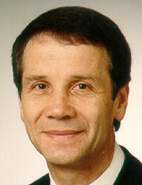
Lenherr |
Lenherr, Hans-Peter (b. July 17, 1948), president of the government of Schaffhausen (1996, 2000, 2003, 2006).
Leni, Nollen (Cornelius), foreign minister of the Solomon Islands (2002). He was also minister of forests, environment, and conservation (1995-96), provincial government and rural development (2001-02), national reform and planning (2002-04), and fisheries and marine resources (2006-07, 2007-10).

Lenihan |
Lenihan, Brian (Joseph), Irish Brian Ó Luineacháin (b. Nov. 17, 1930, Dundalk, County Louth, Ireland - d. Nov. 1, 1995, Dublin, Ireland), Irish politician. He was elected to the Seanad (Senate) in 1957 and to the Dáil (House of Representatives) in 1961. Well regarded for his affable manner, he was seen as one of the rising stars of the Fianna Fáil party, along with his ally Charles Haughey - later prime minister - whom he succeeded as minister of justice in 1964. In this position Lenihan softened the nation's strict censorship laws. He then held successive ministerial posts in education (1968-69), transport and power (1969-73), foreign affairs (1973), and fisheries (1977-79) before serving in Haughey's cabinet as foreign minister (1979-81, 1987-89), minister of agriculture (1982), minister of defense (1989-90), and deputy prime minister (1987-90). As foreign minister he was credited with trying to improve relations with Northern Ireland during a series of crises. In particular, he sought to smooth differences between North and South during the Catholic hunger strikes in a British prison in the North in the early 1980s. In 1990 his party nominated him as its candidate for the presidency, and though he was an early favourite and expected to win in keeping with Fianna Fáil's historic domination of that contest, he narrowly lost to coalition candidate Mary Robinson in the second round. During the campaign he changed his account of his role in a political dispute in 1982, which experts said cost him votes. Following his defeat, he remained active in foreign affairs and domestic politics, helping to form a coalition between the Fianna Fáil and Labour parties in 1992.
Lenihan, Brian (Joseph) (b. May 21, 1959, Dublin, Ireland - d. June 10, 2011, Dublin), justice minister (2007-08) and finance minister (2008-11) of Ireland; son of Brian Lenihan (1930-1995).

Lenin |
Lenin, Vladimir Ilich, original name Vladimir Ilich Ulyanov (b. April 22 [April 10, O.S.], 1870, Simbirsk [now Ulyanovsk], Russia - d. Jan. 21, 1924, Gorky [now Gorky Leninskiye], near Moscow, Russian S.F.S.R.), chairman of the Council of People's Commissars of Russia (1917-24) and of the U.S.S.R. (1923-24); brother-in-law of Mark Yelizarov. He became a Marxist in January 1889. Arrested in December 1895, he was jailed for 15 months and then was sent into exile to Siberia for 3 years. He adopted the pseudonym Lenin in 1901.1 He found himself in the minority at first at the Second Congress (1903) of what was then proclaimed to be the Russian Social-Democratic Workers' Party. But a walkout by some disgruntled Jewish Social-Democrats left him with a slight majority. The members of his group were thus called Bolsheviks (majoritarians), who fought the Mensheviks (minoritarians) ceaselessly within the same party and professed the same program until 1912, when Lenin made the split final. In March 1917, the emperor was deposed. Lenin, who was in exile in Switzerland, hastened home after the German authorities agreed to permit his passage through Germany. To Lenin, the new Provisional Government was a "dictatorship of the bourgeoisie"; from September he urged an armed uprising, which was carried out in November, and he became head of the revolutionary government. He quickly pulled Russia out of World War I, but counterrevolutionaries sought to overthrow his government, and from 1918 to 1920 Russia was torn by a civil war, which cost millions of lives and untold destruction. In June 1922 he threw himself into the formation of the Union of Soviet Socialist Republics, but he became incapacitated as a result of a 1918 assassination attempt; his last public appearance was on Nov. 20, 1922.
1 He used the pen name N. Lenin, and it has been assumed that the "N" stood for Nikolay, but he is not known ever to have signed the full name. Later his original given names were usually attached to his pen name.
Lennon, Lucas Jaime (b. Dec. 11, 1928, Buenos Aires, Argentina - d. March 17, 2023), justice minister of Argentina (1981-83).

P. Lennon |
Lennon, Paul (Anthony) (b. Oct. 8, 1955, Hobart, Tasmania), premier of Tasmania (2004-08).
Lennon, William (b. Dec. 8, 1849, Dublin, Ireland - d. May 5, 1938, Brisbane, Qld.), acting governor of Queensland (1920, 1925-27). He was lieutenant governor in 1920-29.
Lenoir, (Joseph Victor) Jacques (Guy) (b. Aug. 13, 1918, Avignon, Vaucluse, France - d. Dec. 23, 2008, Sanary-sur-Mer, Var, France), prefect of police of Paris (1971-73). He was also prefect of the départements of Vendée (1963-66) and Haut-Rhin (1966-68).
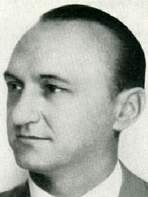
Lenormand |
Lenormand, Maurice (Joseph Henri) (b. Jan. 15, 1913, Mâcon, Saône-et-Loire, France - d. Sept. 8, 2006, Sydney, Australia), vice president of the Government Council of New Caledonia (1957-59, 1978-79). He became an MP in 1951 and gained a profile for his concern of the well-being of the indigenous Kanaks. He formed the Caledonian Union in 1953 under the slogan "two colours, one people." In 1963 he lost his parliamentary seat after being given a suspended one-year jail sentence following a mysterious bombing of the party's newspaper.
Lentsch, Josef (b. 1909 - d. Jan. 26, 1988), premier of Burgenland (1961-64).
Lentswe II a Molefi, also called Linchwe Molefi Kgafela (b. May 2, 1935 - d. Aug. 21, 2007), Kgôsi of baKgatla (1963-2007); son of Molefi a Kgafêla. He was also Botswana's ambassador to the United States (1969-72).
Leo, Clement, foreign minister of Vanuatu (1998-99). He was also minister of health (2001-02).
León (Carrera), J(osé) Matías (b. Feb. 24, 1865, Lima, Peru - d. May 19, 1939, Miraflores, Lima province, Peru), justice and education minister of Peru (1909-10, 1929-30).
León (Uranga), Luis L(aureano) (b. July 4, 1890, Ciudad Juárez, Chihuahua, Mexico - d. Aug. 21, 1981, Mexico City, Mexico), governor of Chihuahua (1929). He was also Mexican minister of agriculture and development (1924-28) and industry, commerce, and labour (1930).
León (Cárdenas), Matías (b. Feb. 24, 1793, Lima, Peru - d. Feb. 10, 1860, Lima), foreign minister (1830 [acting], 1831-32, 1834-35, 1843, 1844-45, 1845, 1848) and interior minister (1830 [acting], 1831-32, 1834-35, 1843, 1844-45) of Peru. He was also minister to Chile (1839-40) and Ecuador (1841-42) and president of the Supreme Court (1847-49).
León Barandiarán, José (b. Dec. 8, 1899, Lambayeque, Peru - d. July 24, 1987, Lima, Peru), justice and labour minister of Peru (1948). He was also rector of the University of San Marcos (1957-61).
León Brindis, Samuel (b. June 13, 1895, Ocozocoautla de Espinosa, Chiapas, Mexico - d. May 22, 1987, Tuxtla Gutiérrez, Chiapas), governor of Chiapas (1958-64).
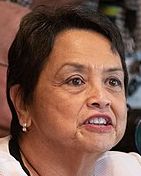
Leon Guerrero |
Leon Guerrero, Lou(rdes Aflague) (b. Nov. 8, 1950), governor of Guam (2019- ).
León Heredia, Julio (César) (b. Oct. 23, 1966), governor of Yaracuy (2008- ).
León Luco, Ramón (b. 1859? - d. Oct. 10, 1929, Santiago, Chile), war and marine minister of Chile (1911). He was also minister of industry, public works, and railways (1916-17).
León y Castillo, Fernando, (from 1900) marqués del Muni (b. Nov. 30, 1842, Telde, Gran Canaria, Spain - d. March 12, 1918, Biarritz, France), interior minister of Spain (1886-87). He was also overseas minister (1881-83) and ambassador to France (1887-90, 1892-95, 1897-1910, 1915-18).
Léonard, (Joseph Étienne) Roger (b. April 27, 1898, Bordeaux, Gironde, France - d. June 17, 1987, Paris, France), prefect of police of Paris (1947-51) and governor-general of Algeria (1951-55). He was also prefect of Seine-et-Oise département (1944-47) and first president of the French Court of Accounts (1955-69).
Leonas, Petras (b. Nov. 16, 1864, Leskava, Russia [now in Lithuania] - d. May 12, 1938, Kaunas, Lithuania), justice minister (1918-19) and interior minister (1919) of Lithuania. He was also a member of the Russian State Duma (1907).
Leonas, Silvestras (b. Jan. 15, 1894, Leskava, Russia [now in Lithuania] - d. Nov. 17, 1959, Kaunas, Lithuanian S.S.R.), interior minister of Lithuania (1938-39); nephew of Petras Leonas.
Leonce-Ceryl, Sonia, Saint Lucian diplomat. She was chargé d'affaires at the United Nations (1996-98).
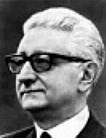
G. Leone |
Leone, Giovanni (b. Nov. 3, 1908, Pomigliano d'Arco, near Naples - d. Nov. 9, 2001, near Rome), president of Italy (1971-78). He entered politics in 1945, becoming one of the founders of the Naples branch of the Christian Democratic Party. He took part in the Constituent Assembly that drafted the new republic's constitution. First elected to parliament in 1948, he served as vice president (1950-55) and president (1955-63) of the Chamber of Deputies (the legislature's lower house) and as caretaker prime minister (1963, 1968). His most notable achievement came in 1970 when, as a member of the Senate, his successful negotiations helped to bring about his country's first divorce law. A church-led attempt to repeal the law was overwhelmingly defeated in 1972. He first was a presidential candidate in 1964, but withdrew after the 15th ballot in the electoral college. In 1971, he was elected president. He resigned six months before the end of his seven-year term amid allegations of links to a major payoff scandal involving the U.S. aircraft manufacturer Lockheed. He called the accusations against him "slanderous," and claimed the scandal had weakened his political clout. He said he resigned in the interest of democratic stability. The allegations were never proven. Like all former presidents, Leone was later made a senator for life.
Leone, Mario (b. Aug. 24, 1922, Florence, Italy), president of Toscana (1978-83).
Leong Yew Koh, Tun (b. Aug. 22, 1888, Salak North, Perak, Malaya [now in Malaysia] - d. Jan. 12, 1963, Petaling Jaya, Selangor, Malaya [now in Malaysia]), governor of Malacca (1957-59). He was also Malayan minister of health (1955-57) and justice (1959-63). He was awarded the title Tun in 1958.
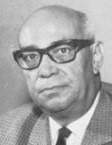
Leoni |
Leoni (Otero), Raúl (b. April 26, 1905, El Manteco, Bolívar state, Venezuela - d. July 5, 1972, New York City), president of Venezuela (1964-69). As a student he was first jailed in 1921 for his role in an insurrection against the government of dictator Juan Vicente Gómez. Following several other jailings and another attempt against the Gómez regime, he was exiled to Bogotá, Colombia. He returned in January 1936, shortly after the dictator's death, and founded the National Democratic Party in 1937, but was repeatedly forced into exile by military governments during the next 20 years. In 1941 he joined with Rómulo Betancourt and others to form the Democratic Action party. In 1945-48 he served as minister of labour. He returned to Caracas when Gen. Marcos Pérez Jiménez was overthrown in 1958, and he was elected to the Senate. During the 1959-64 presidency of Betancourt, Leoni served as leader of the Democratic Action party. Elected president in December 1963, Leoni had the sensitive job of trying to reduce the tensions he inherited from Betancourt, who had simultaneously alienated Venezuela's left and right. During Leoni's presidency, Venezuela maintained rapid economic growth, based on booming oil production and a new multibillion dollar petrochemical industry. Agrarian reforms proceeded less swiftly, and the persisting unevenness of the economy cost him the support of university student activists. In December 1966, he suspended constitutional guarantees for several months in a drive against revolutionaries whom he linked to Cuban leader Fidel Castro. During this time he sent troops to seize an arsenal in Caracas' Central University which had until then remained immune from action by police or army. Ironically, his own party had emerged from that same university.
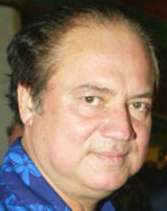
Léontieff |
Léontieff, Alexandre (b. Oct. 20, 1948, Teahupoo, Tahiti island, French Settlements in Oceania [now French Polynesia] - d. March 2, 2009), president of the government of French Polynesia (1987-91).
Leonty, secular name Ivan (Alekseyevich) Lebedinsky (b. Feb. 3 [Jan. 22, O.S.], 1822, Novaya Kalitva, Voronezh province, Russia - d. Aug. 13 [Aug. 1, O.S.], 1893, Cherkizovo [now part of Moscow], Russia), metropolitan of Moscow (1891-93). He was also bishop of Revel (1860-63) and Podolia (1863-73) and archbishop of Podolia (1873-74), Kherson (1874-75), and Kholm (1875-91).
Leonty, secular name Leonid (Ieronimovich) Turkevich (b. Aug. 20 [Aug. 8, O.S.], 1876, Kremenets, Volyn province, Russia [now in Ternopil oblast, Ukraine] - d. May 14, 1965, Syosset, N.Y.), metropolitan of All America and Canada (1950-65). He was also bishop of Chicago (1933-50).
Leontyev, Anatoly (Mikhailovich) (b. Feb. 15, 1937, Novoye Sheptakhovo, Chuvash A.S.S.R., Russian S.F.S.R. - d. June 17, 2007), chairman of the Presidium of the Supreme Soviet (1988-90) and chairman of the Supreme Soviet (1990-91) of the Chuvash A.S.S.R.
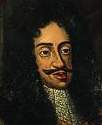
Leopold I |
Leopold I, in full Leopold Ignaz Joseph Balthasar Felician, Hungarian Lipót Ignác József Boldizsár Felician (b. June 9, 1640, Vienna, Austria - d. May 5, 1705, Vienna), archduke of Austria and king of Hungary (1657-1705) and emperor of the Holy Roman Empire (1658-1705). He was the second son of Ferdinand III's first marriage, to his cousin Maria Anna, daughter of Felipe III of Spain. When his elder brother, Ferdinand IV, died quite unexpectedly (1654), Leopold became heir apparent to the Austrian Habsburg lands. In 1657, his father died, and after long and difficult struggles against the opposition of France, Leopold was elected and crowned emperor in 1658. He acquired a claim to the Spanish throne by his first marriage (1666) to Margarita Teresa (1651-1673), daughter of Felipe IV of Spain. Leopold's health was bad, and, when he fell dangerously ill in 1670, the Austrian line of the Habsburgs was expected to become extinct. But he recovered, and in 1673 married Claudia Felicitas (1653-1676) from the Tirolian branch of the Austrian Habsburgs. In 1676 he solemnized his third marriage, with Eleonora of Palatinate-Neuburg (1655-1720); this union produced 10 children, among them the future emperors Joseph I and Karl VI. From the beginning Leopold had to fight wars, first of all against the Turks; in 1683 they appeared before Vienna, and for the second time in its history the city suffered a Turkish siege. When the childless Carlos II of Spain died in 1700, his throne and the vast Spanish holdings passed by bequest to Philippe, duc d'Anjou, a grandson of Louis XIV of France. There could be no question for Leopold that the Spanish heritage had to be defended by force of arms. In the middle of the War of the Spanish Succession (1701-14), Leopold died.

Léopold I |
Léopold I, in full Léopold Georges Chrétien Frédéric, Dutch Leopold Joris Christiaan Frederik (b. Dec. 16, 1790, Coburg, Saxe-Coburg-Saalfeld - d. Dec. 10, 1865, Laeken, Belgium), king of Belgium (1831-65). The third son of Franz, duke of Saxe-Coburg-Saalfeld, Léopold served in the Russian army against Napoléon's forces during the Napoleonic Wars (1800-15); in 1816 he married Charlotte, the only child of the future king George IV of Great Britain. Although the princess died in 1817, Léopold continued to live in England until 1831, when he accepted his election as the first king of the Belgians, having declined the Greek crown the previous year. He immediately began to strengthen the Belgian army and, with assistance from France and England, fought off the attacks of Willem I of the Netherlands, who at first refused to recognize Belgium as an independent kingdom. Until 1839 Léopold helped maintain a Liberal-Catholic coalition that expanded the educational system. In 1836 he granted greater political autonomy to large towns and rural areas. The coalition ended in 1839 with the removal of Dutch pressure through Willem I's recognition of the Belgian kingdom. Léopold signed commercial treaties with Prussia (1844) and France (1846) and maintained a neutral foreign policy, most notably during the Crimean War (1853-56). In 1848 his throne stood unshaken during the revolutions which marked that year in most other European countries. After the accession of a hostile regime under Napoléon III in France (1852), he sponsored a fortification of the Antwerp area, completed in 1868. Often spoken of as the "Nestor of Europe," Léopold was highly influential in European diplomacy. In 1832 he married Louise Marie of Orléans (1812-1850), daughter of the French king Louis-Philippe.
Leopold II, in full Peter Leopold Joseph Johann Anton Joachim Pius Gotthard, Hungarian Péter Lipót József János Antal Joákim Pius Gotthard (b. May 5, 1747, Vienna, Austria - d. March 1, 1792, Vienna), grand duke of Tuscany (as Pietro Leopoldo I) (1765-90) and archduke of Austria, king of Hungary, and Holy Roman emperor (1790-92); son of Maria Theresia and Franz I (1708-1765).
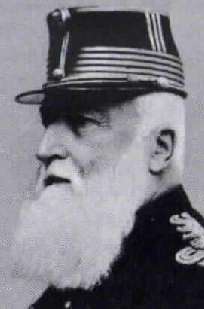
Léopold II |
Léopold II, in full Léopold Louis Philippe Marie Victor, Dutch Leopold Lodewijk Filips Maria Victor (b. April 9, 1835, Brussels - d. Dec. 17, 1909, Laeken, Belgium), king of Belgium (1865-1909). The eldest son of Léopold I, first king of the Belgians, and his second wife, Louise Marie of Orléans, he became duke of Brabant in 1840 and served in the Belgian army. In 1853 he married Marie Henriette (1836-1902), daughter of the Austrian archduke Joseph, palatine of Hungary, and he became king on his father's death in 1865. The domestic affairs of his reign were dominated by a growing conflict between the Liberal and Catholic parties over suffrage and education issues, but he concentrated on developing the nation's defenses. He was jealous of his country's neutrality, which, though preserved during the Franco-German War (1870-71), was imperilled by the increasing strength of France and Germany. In 1887 he persuaded parliament to finance the fortification of Liège and Namur. A military conscription bill, for which he had long argued, was passed shortly before his death. But most notably, he was determined early on to acquire a colony. In 1876 he founded what in 1882 was named the International Association of the Congo, to explore that area, with Sir Henry Morton Stanley as his main agent. Stations were established and treaties with native chiefs concluded, and in 1885 the leading powers recognized Léopold as the sovereign of the Congo Free State, an area 80 times the size of Belgium. The exposure of mistreatment of natives in the rubber industry in 1904 led to the decline of his personal rule in the region. Britain, with U.S. aid, pressured Belgium to annex the Congo state to redress the "rubber atrocities"; the area became the Belgian Congo in 1908.
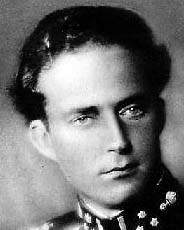
Léopold III |
Léopold III, in full Léopold Philippe Charles Albert Meinrad Hubertus Marie Miguel, Dutch Leopold Filips Karel Albert Meinrad Hubertus Maria Miguel (b. Nov. 3, 1901, Brussels - d. Sept. 25, 1983, Brussels), king of Belgium (1934-51). The son of Albert I and his consort Elisabeth of Bavaria, he was a soldier during the final campaign of World War I. On Nov. 10, 1926, he married Princess Astrid of Sweden (killed Aug. 28, 1935, in a motor accident near Luzern, Switzerland); their children were Joséphine-Charlotte, Baudouin, and Albert. He became king of the Belgians following his father's death in 1934. When the Germans invaded in World War II, he assumed supreme command of the Belgian army; he surrendered his encircled forces on May 28, 1940, 18 days after the invasion. He remained with his troops, rather than joining the London government in exile, and was held prisoner by the Germans at his royal château near Brussels. On Sept. 11, 1941, he married Mary Lilian Baels (1916-2002; daughter of Henri Baels), whom he made princesse de Réthy; their children were Alexandre, Marie-Christine, and Maria Esmeralda. On June 7, 1944, he and his wife and a son were removed to a fort in Hirschstein, near Dresden, Saxony, then on March 6, 1945, to Strobl, near Salzburg, Austria, where on May 8 they were liberated by the U.S. 7th Army. His brother Charles having been appointed regent in 1944, Léopold remained in Pregny, near Geneva, Switzerland, awaiting resolution of the controversy over his pending return to the throne. In a plebiscite held March 12, 1950, 57.9% of the voters favoured his return, and on July 22 he returned to Brussels. But unrest fomented by Liberal, Socialist, and Walloon opposition led him to renounce his sovereignty on Aug. 11, 1950, in favour of his son Baudouin, who became king in 1951.
Leoro Franco, Galo (Alberto) (b. Dec. 15, 1926, Ibarra, Ecuador - d. June 26, 2014, Quito, Ecuador), foreign minister of Ecuador (1994-97). He was also ambassador to the Dominican Republic (1971-72), the United Kingdom (1983-84), and the Vatican (1993-94) and permanent representative to the OAS (1972-79).
Léotard, François (Gérard Marie) (b. March 26, 1942, Cannes, Alpes-Maritimes, France), French defense minister (1993-95). He was also minister of culture and communication (1986-88) and president of the Republican Party (1988-90, 1995-97) and the Union for French Democracy (1996-98).
Lepa, Alfred (Karlovich), Latvian Alfreds Liepa (b. Aug. 5 [July 24, O.S.], 1896, Riga, Russia [now in Latvia] - d. [executed] May 9, 1938, Kazan, Russian S.F.S.R.), first secretary of the Communist Party committee of the Tatar A.S.S.R. (1933-37). He was also executive secretary of the party committees of Kursk (1926-28) and Vyatka (1928-29) provinces.
Lepage (Barreto), Octavio (b. Nov. 24, 1923, Santa Rosa, Anzoátegui, Venezuela - d. Jan. 6, 2017, Caracas, Venezuela), acting president of Venezuela (1993). He was ambassador to Belgium and Luxembourg (1964-65), interior minister (1975-78, 1984-86), and president of the Senate (1989, 1993).
Lepère, (Edme) Charles (Philippe) (b. Feb. 1, 1823, Auxerre, Yonne, France - d. Sept. 6, 1885, Auxerre), interior minister of France (1879-80). He was also minister of agriculture and commerce (1879).
Lepikson, Robert (b. June 14, 1952, Tallinn, Estonian S.S.R. - d. July 1, 2006, Rakvere, Estonia), interior minister of Estonia (1997-98). He was also mayor of Tallinn (1996-97).
Lépine, Louis (Jean Baptiste) (b. Aug. 6, 1846, Lyon, France - d. Nov. 10, 1933, Paris, France), prefect of police of Paris (1893-97, 1899-1913) and governor-general of Algeria (1897-98). He was also prefect of the départements of Indre (1885-86), Loire (1891-93), and Seine-et-Oise (1893).
Lepoil dit Bernys, Georges Victor Gustave (b. Aug. 24, 1902, Paris, France - d. May 7, 1960, Quito, Ecuador), French official. He was prefect of the départements of Maine-et-Loire (1946-47) and Haut-Rhin (1947-55) and ambassador to Ecuador (1959-60).
Lepori, Giuseppe (b. June 2, 1902, Massagno, Ticino, Switzerland - d. Sept. 6, 1968, Seravezza, Lucca province, Italy), president of the Council of State of Ticino (1941-42, 1946-47, 1951-52). He was also posts and railways minister of Switzerland (1955-59).
Lepper, Andrzej (Zbigniew) (b. June 13, 1954, Stowiecino, Poland - d. [suicide] Aug. 5, 2011, Warsaw, Poland), Polish politician. He was a presidential candidate (1995, 2000, 2005, 2010) and a deputy prime minister and minister of agriculture and rural development (2006, 2006-07).
Lepping, Sir George (Gerea Dennis) (b. Nov. 22, 1947 - d. Dec. 24, 2014, Honiara, Solomon Islands), governor-general of the Solomon Islands (1988-94); knighted 1988.
Leprette, Jacques (b. Jan. 22, 1920, Alexandria, Egypt - d. April 2, 2004, Paris, France), French diplomat. He was ambassador to Mauritania (1961-63) and permanent representative to the United Nations (1976-82) and the European Community (1982-85).
Lepreux, Charles (Jules Louis) (b. Feb. 7, 1856, Valenciennes, Nord, France - d. Oct. 10, 1930, Saint-Christophe-des-Bardes, Gironde, France), acting governor-general of Madagascar (1905-06) and governor of Martinique (1906-08).
Lepro, Alfredo (b. 1903, Trinidad, Uruguay - d. July 14, 1986, Montevideo, Uruguay), interior minister of Uruguay (1968-69). He was also ambassador to Colombia (1970-71) and Portugal (1972-73).
Lequerica (Erquiza), José Félix de (b. Jan. 30, 1891, Bilbao, Spain - d. June 9, 1963, Bilbao), foreign minister of Spain (1944-45). He was also mayor of Bilbao (1938-39), ambassador to France (1939-44) and the United States (1951-54), and permanent representative to the United Nations (1956-63).

Lèques |
Lèques, Jean (Georges) (b. Aug. 31, 1931, Nouméa, New Caledonia - d. June 1, 2022), president of the government of New Caledonia (1999-2001). He was also mayor of Nouméa (1986-2014). After being reelected as mayor on March 11, 2001, he expressed the view that he wished to spend all his time on the town, which he thought he had neglected since he had been New Caledonia's president.
Lér, Leopold (b. Oct. 23, 1928, Ostrava, Czechoslovakia [now in Czech Republic] - d. April 20, 2013), finance minister of Czechoslovakia (1973-85). He was also finance minister of the Czech Socialist Republic (1969-73).

Lerdo |
Lerdo de Tejada (y Corral), Sebastián (b. April 25, 1823/25/27, Xalapa, Veracruz, Mexico - d. April 21, 1889, New York City), president of Mexico (1872-76). In 1855 he was made a judge of the Supreme Court and in 1857 he was appointed foreign minister. He was identified with the Liberal administration of Benito Juárez and was a member of the Mexican Congress in 1861-62, and opposed the treaty that had been made for arranging the English debt. He was appointed subsequently by Juárez to arrange a treaty of commerce and extradition with the United States, which was highly beneficial to his country. He afterward held the positions of justice and foreign minister under Juárez. He became president of the Supreme Court and de facto vice president of the Mexican republic after its restoration in 1867. After Juárez' death in 1872, Lerdo became president of Mexico, only to be immediately challenged by Porfirio Díaz, another of Juárez' lieutenants. He issued a decree of amnesty, and all the rebellious chiefs, including Díaz, made their submission. He was elected president by the Congress in November 1872 and retained the Juárez cabinet. But when in 1875 he was proclaimed a candidate for reelection in 1876, revolutionary movements emerged again; he was opposed by provincial chieftains who resented his centralized government, by the church for his connection with the anticlerical reforms of Juárez, and by progressives who criticized his failure to undertake public works. Díaz led a successful uprising, and Lerdo and his cabinet fled. They were captured by Pioquinto Huato, a bandit, and were held for $30,000 ransom. After this episode he went to New York, where he remained until his death.
Lere, (Alhaji Ahmed Dabo) Mohammed (b. March 16, 1940, Lere [now in Kaduna state], Nigeria - d. Feb. 18, 2002, Abuja, Nigeria), governor of Kaduna (1992-93).
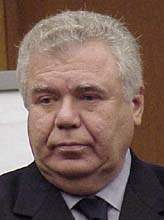
J. Lerner | 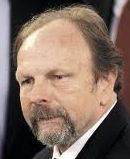
S. Lerner |
Lerner, Jaime (b. Dec. 17, 1937, Curitiba, Brazil - d. May 27, 2021, Curitiba), governor of Paraná (1995-2003). He was also mayor of Curitiba (1971-74, 1979-83, 1989-92).
Lerner (Ghitis), Salomón, byname Siomi Lerner (b. Feb. 4, 1946, Lima, Peru), prime minister of Peru (2011).
Leroy, Jean Baptiste Reynold, Haitian diplomat. He was chargé d'affaires at the United Nations (2018-19).
Leroy, Jean Dominique (b. 1758, Paris, France - d. Aug. 21, 1803, Paris), French official. He was prefect of Aude département (1802-03).
Leroy de Saint-Arnaud, Armand Jacques Achille (b. Aug. 20, 1798, Paris, France - d. Sept. 29, 1854, at sea, aboard the Berthollet), war minister of France (1851-54); son of Jean Dominique Leroy.
Lerroux García, Alejandro (b. March 4, 1864, La Rambla, Córdoba province, Spain - d. June 27, 1949, Madrid, Spain), foreign minister (1931, 1935) and prime minister (1933, 1933-34, 1934-35) of Spain.
Lersundi y Ormaechea, Francisco de (b. Jan. 28, 1817, Valencia, Spain - d. Nov. 17, 1874, Bayonne, France), prime minister of Spain (1853) and governor of Cuba (1866, 1867-69). He was also minister of war (1851-52, 1853, 1863-64) and navy (1856-57).
Les, Gabriel-Beniamin (b. Dec. 23, 1975, Satu Mare, Romania), defense minister of Romania (2017, 2018-19).
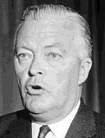
Lesage |
Lesage, Jean (b. June 10, 1912, Montreal, Quebec - d. Dec. 12, 1980, Sillery, near Québec, Quebec), premier of Quebec (1960-66). In 1945 he was elected to the Canadian House of Commons - to serve as parliamentary assistant to leading members of the cabinet and also as a delegate to the United Nations. He became minister of resources and development (1953) and of northern affairs and national resources (1953-57). In 1958 he resigned his seat in the Commons to become leader of the Quebec Liberal Party. In the provincial elections of 1960 he led the Liberals to victory over the conservative Union Nationale, which had been in office since 1944. With a platform calling for social and cultural reform as well as greater provincial autonomy, he set out to lead Quebec's "Quiet Revolution." His cabinet of diverse and, to some extent, disputatious personalities was dubbed l'équipe de tonnerre ("the team of thunder"). Under his administration, for the first time schools became a government responsibility instead of being left in the hands of the Roman Catholic Church; he appointed the first minister of education in Quebec. The government also took over other institutions that had been under religious control. The civil service was also modernized. He served as his own finance minister and minister of federal-provincial affairs and won major fiscal concessions from the federal government. His administration was also active in developing closer ties with France through cultural and educational accords. He decisively won the 1962 provincial election on the issue of the nationalization of hydroelectric power. In 1966, however, the Liberals were defeated by the renovated Union Nationale. He was then leader of the opposition until 1970, when he was succeeded by his protégé Robert Bourassa.
Lescano (Ancieta), Yonhy (b. Feb. 15, 1959, Puno, Peru), Peruvian presidential candidate (2021). He was also secretary-general of Popular Action (2009-11).
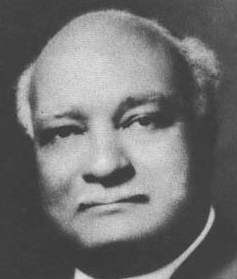
É. Lescot |
Lescot, (Antoine Louis Léocardie) Élie (b. Dec. 9, 1883, Saint-Louis-du-Nord, Haiti - d. Oct. 20, 1974, Laboule, Haiti), president of Haiti (1941-46). He was also minister of education, agriculture, and labour (1930), justice (1932-33), and interior (1932-34) and minister to the Dominican Republic (1934-37) and the United States (1937-41).
Lescot, (Jean-Baptiste) Gérard (b. April 20, 1914, Port-de-Paix, Haiti - d. Oct. 7, 1979), foreign minister of Haiti (1943-46); son of Élie Lescot.
Lescure, Frédéric (b. May 25, 1904 - d. Dec. 5, 1993), president of the Regional Council of Bourgogne (1983-85).
Lesechko, Mikhail (Avksentyevich) (b. Oct. 16 [Oct. 3, O.S.], 1909, Aleksandrovsk, Yekaterinoslav province, Russia [now Zaporizhzhya, Ukraine] - d. Jan. 21, 1984, Moscow, Russian S.F.S.R.), Soviet politician. He was minister of instrument-making and automation (1956-57) and a deputy premier (1962-80).
Lesh, Leonid (Vilgelmovich) (b. Jan. 21 [Jan. 9, O.S.], 1862 - d. Aug. 28, 1934, Dubrovnik, Yugoslavia [now in Croatia]), military governor of Zakaspiyskaya oblast (1913-16).
Leshchinsky, Pavel (Donatovich) (b. Jan. 3, 1895, St. Petersburg, Russia - d. [executed] May 17, 1938, Kuybyshev, Russian S.F.S.R. [now Samara, Russia]), executive secretary of the Communist Party committee of the Kabardino-Balkar autonomous oblast (1924-25). He was also executive secretary of the party committee of Novgorod province (1921-23).
Leskinen, Väinö Olavi (b. March 8, 1917, Helsinki, Finland - d. March 8, 1972, Helsinki), foreign minister of Finland (1970-71). He was also minister of social affairs (1952-53, 1958-59), interior (1954-55), and trade and industry (1968-70).
Leslie, John Clifford, byname Jack Leslie (b. 1920, Calgary, Alta. - d. Dec. 27, 2010), mayor of Calgary (1965-69).
Leslie, Robert (Anthony) (b. Aug. 16, 1942, Belize, British Honduras [now Belize City, Belize]), Belizean diplomat. He was permanent representative to the United Nations (1982-85), high commissioner to the United Kingdom (1991-93), and ambassador to the Vatican (1992-93).
Leslie, Stuart (Warren) (b. Sept. 30, 1964), acting governor-general of Belize (2021). He was also permanent representative to the United Nations (2000-05).
Lesniewski, Józef K(rzysztof) (b. Sept. 26 [Sept. 14, O.S.], 1867, Nevel district, Vitebsk province, Russia [now in Belarus] - d. Oct. 3, 1921, Warsaw, Poland), military affairs minister of Poland (1919-20).
Lesovsky, Stepan (Ivanovich) (b. 1781, Moscow province, Russia - d. Nov. 23 [Nov. 11, O.S.], 1839, Chernigov, Russia [now Chernihiv, Ukraine]), governor of Kursk (1826-30); illegitimate son of Knyaz Nikolay Repnin.
Lesovsky, Stepan (Stepanovich) (b. 1817, Rethel, Ardennes, France - d. March 9 [Feb. 26, O.S.], 1884, St. Petersburg, Russia), Russian navy minister (1876-80); son of Stepan (Ivanovich) Lesovsky.
Lespinasse, (Jean Pierre Joseph) Edmond (b. 1856 - d. Dec. 1, 1933, Port-au-Prince, Haiti), member of the Council of Secretaries of Haiti (1912, 1913).
Lessa, Francisco de Sá (b. May 20, 1887, Diamantina, Minas Gerais, Brazil - d. June 26, 1977, Rio de Janeiro, Brazil), prefect of Distrito Federal (1955-56).
Lessa, Macário das Chagas Rocha (b. Coruripe, Alagoas, Brazil - d. ...), acting governor of Alagoas (1912).
Lessa Santos, Ronaldo Augusto (b. April 25, 1949, Maceió, Alagoas, Brazil), governor of Alagoas (1999-2006).
Lesufi, Panyaza, byname of Andrek Lesufi (b. Sept. 4, 1968, Dindela, Transvaal [now in Gauteng], South Africa), premier of Gauteng (2022- ).
Letcher, Robert P(erkins) (b. Feb. 10, 1788, Goochland county, Va. - d. Jan. 24, 1861, Frankfort, Ky.), governor of Kentucky (1840-44). He was also U.S. minister to Mexico (1850-52).
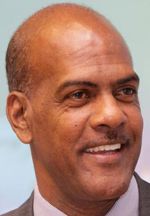
Letchimy |
Letchimy, Serge (b. Jan. 13, 1953, Gros-Morne, Martinique), president of the Regional Council (2010-15) and of the Executive Council (2021- ) of Martinique.
Letelier (Núñez), Aníbal (del Rosario) (b. March 5, 1862, Talca, Chile - d. Feb. 25, 1930, Viña del Mar, Chile), justice (and education) minister of Chile (1911, 1913).

O. Letelier | 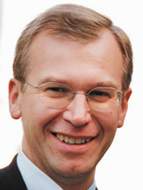
Leterme |
Letelier (del Solar), Orlando (b. April 13, 1932, Temuco, Chile - d. [assassinated] Sept. 21, 1976, Washington, D.C.), foreign minister (1973), interior minister (1973), and defense minister (1973) of Chile. He was also ambassador to the United States (1971-73).
Letelier Espínola, Miguel (Wenceslao) (b. May 15, 1883, Santiago, Chile - d. Nov. 8, 1965, Santiago), interior minister of Chile (1931). He was also minister of industry, public works, and railways (1922).
Letelier Icaza, Luis Felipe (b. Dec. 3, 1906, Talca, Chile - d. Jan. 18, 1993, Santiago, Chile), justice minister of Chile (1948-49). He was also minister of labour (1949-50).
Letellier, René (Laurent Paul) (b. June 18, 1914, Juaye-Mondaye, Calvados, France - d. Jan. 20, 2000, Cagnes-sur-Mer, Alpes-Maritimes, France), prefect of French Guiana (1963-67). He was also prefect of Ardèche département (1967-69).
Leterme, Yves (Camille Désiré) (b. Oct. 6, 1960, Wervik, Belgium), minister-president of Flanders (2004-07) and prime minister (2008, 2009-11) and foreign minister (2009) of Belgium.
Letsie, Thaabe (b. April 4, 1940, Qeme, near Maseru), foreign minister of Lesotho (1988-90).

Letsie III | 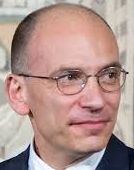
Letta |
Letsie III, original name David Mohato Bereng Seeiso (b. July 17, 1963, Morija, western Lesotho), king of Lesotho (1990-95, 1996- ).
Letta, Enrico (b. Aug. 20, 1966, Pisa, Italy), prime minister of Italy (2013-14). He was also minister of EU policy (1998-99) and industry (1999-2001) and leader of the Democratic Party (2021-23).
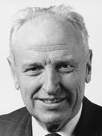
Leuba | 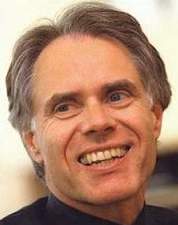
Leuenberger |
Leuba, Jean-François (b. July 16, 1934, Lausanne, Vaud, Switzerland - d. Oct. 22, 2004), president of the Council of State of Vaud (1983, 1989) and president of the Swiss National Council (1995-96).
Leuca, Gheorghe (b. May 22, 1957, Milesti, Moldavian S.S.R.), Moldovan diplomat. He has been ambassador to Azerbaijan, Georgia, Iran, and India (2016-19) and permanent representative to the United Nations (2021- ).
Leuenberger, Moritz (b. Sept. 21, 1946, Biel, Bern, Switzerland), president of Switzerland (2001, 2006). He was environment, transport, energy, and communications minister (1996-2010).
Leullier, (Alexandre Louis Henri) Robert (b. Sept. 15, 1870, Lignières-Châtelain, Somme, France - d. July 5, 1922, Paris, France), prefect of police of Paris (1921-22). He was also prefect of the départements of Gers (1909-11), Aube (1911-12), Aisne (1912-18), and Pas-de-Calais (1918-21).
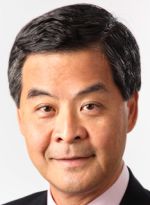
Leung |
Leung Chun-ying, also called C.Y. Leung (b. Aug. 12, 1954, Hong Kong), chief executive of Hong Kong (2012-17).
Leurquin, Bernard (Gaston) (b. April 4, 1933, Bavay, Nord, France), prefect of Saint-Pierre and Miquelon (1985-87). He was also prefect of the French département of Alpes-de-Haute-Provence (1987-90).
Leushkin, Sergey (Gennadiyevich) (b. Oct. 9, 1950, Korf, Kamchatka oblast, Russian S.F.S.R. [now in Kamchatka kray, Russia] - d. April 20, 2008), chairman of the Executive Committee (1990-91) and head of the administration (1991-96) of Koryak autonomous okrug.
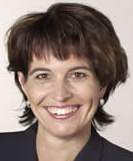
Leuthard |
Leuthard (Hausin), Doris (b. April 10, 1963, Merenschwand, Aargau, Switzerland), economy minister (2006-10), vice president (2009, 2016), president (2010, 2017), and environment, transport, energy, and communications minister (2010-18) of Switzerland. She was president of the Christian Democratic People's Party in 2004-06, resigning that post after being elected to the Federal Council.
Leutheusser-Schnarrenberger, Sabine (b. July 26, 1951, Minden, Nordrhein-Westfalen, West Germany), justice minister of Germany (1992-96, 2009-13); niece of Wolfgang Stammberger.
Leuthold, Bruno (b. Oct. 2, 1923, Stans, Nidwalden, Switzerland), Landammann of Nidwalden (1986-87, 1988-89).
Levallois, Michel (Francis Léon) (b. Jan. 16, 1934, Paris, France - d. April 29, 2018, Paris), prefect of Réunion (1981-84). He was also prefect of Haute-Marne département (1978-81).
Levashov, Nikolay (Vasilyevich) (b. Nov. 26 [Nov. 14, O.S.], 1828 - d. Feb. 4 [Jan. 23, O.S.], 1888), governor of Oryol (1861-66, acting to 1862) and St. Petersburg (1866-71); son of Vasily (Vasilyevich) Levashov.
Levashov, Vasily (Vasilyevich) (b. Oct. 21 [Oct. 10, O.S.], 1783 - d. Oct. 5 [Sept. 23, O.S.], 1848, St. Petersburg, Russia), military governor of Kiev and governor-general of Podolia and Volyn (1832-35), governor-general of Chernigov, Poltava, and Kharkov (1835-37), and chairman of the Imperial State Council and the Committee of Ministers of Russia (1848); great-grandson of Vasily (Yakovlevich) Levashov.
Levashov, Vasily (Yakovlevich) (b. 1667 - d. April 18 [April 7, O.S.], 1751), governor-general of Moscow (1744-51).
Levashov, Graf (Count) Vladimir (Vasilyevich) (b. Dec. 12 [Nov. 30, O.S.], 1834 - d. June 7 [May 26, O.S.], 1898), military governor of Kutaisi (1867-74); son of Vasily (Vasilyevich) Levashov; son-in-law of Graf Viktor Panin. He was also gradonachalnik (city governor) of Odessa (1876-78).
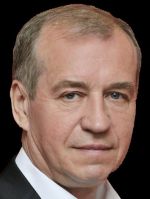
Levchenko |
Levchenko, Sergey (Georgiyevich) (b. Nov. 2, 1953, Novosibirsk, Russian S.F.S.R.), governor of Irkutsk oblast (2015-19).
Levecque, Fernand (Ernest) (b. Sept. 2, 1852, Beaurieux, Aisne, France - d. July 4, 1947, Paris, France), acting mayor of Amiens (1881-82, 1884), resident-superior of Annam (1906-08), and governor of French India (1909-10), French Guiana (1914-16), and Martinique (1921-23).
Leven, Fridrikh, German Friedrich von Löwen (b. July 5, 1654, Lohde [Koluvere] castle, Sweden [now in Estonia] - d. July 9, 1744, Reval, Russia [now Tallinn, Estonia]), governor of Reval (1730-35).
Levendal, Graf Vladimir, German Ulrich Friedrich Woldemar Graf von Löwendal (b. April 6, 1700, Hamburg [Germany] - d. May 27, 1755, Paris, France), governor of Reval (1740-43); great-grandson of Frederik III (king of Denmark 1648-70). In 1741 he was raised from Freiherr (baron) to Graf (count).
Levens, Marie, byname of Maria Elizabeth Levens (b. 1950), foreign minister of Suriname (2000-05).
Lévêque, Michel (b. July 19, 1933, Algiers, Algeria), minister of state of Monaco (1997-2000). He was also French ambassador to Libya (1985-89), Morocco (1991-93), Brazil (1993-94), and Algeria (1995-97).
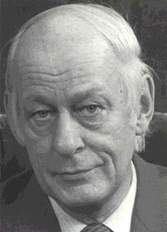
Lévesque |
Lévesque, René (b. Aug. 24, 1922, New Carlisle, Quebec - d. Nov. 1, 1987, Montreal, Quebec), premier of Quebec (1976-85). He entered politics in 1960 and was elected to the Quebec National Assembly as a Liberal member for Gouin, joining Jean Lesage's government first as minister of public works and hydraulic resources (1960-61), and then holding the newly created portfolio of natural resources (1961-65); during the last months of the Lesage government in 1966, he was minister of family and social welfare. He was reelected in the Montreal constituency of Laurier in the 1962 and 1966 elections. He became disenchanted with the Liberal Party's stand on constitutional issues, and in October 1967 he and others founded the Mouvement Souveraineté-Association, which the following year combined with other separatist groups to form the Parti Québécois (PQ), with Lévesque as its first president. He was unsuccessful in the elections of 1970 and 1973 (although the PQ became the official opposition party in Quebec in the latter year) but in 1976 his party won control of the provincial National Assembly and he became premier. He introduced several important pieces of legislation, notably Bill 101, which established French as the official language of Quebec. His independence plan was rejected by 59.6% of the Quebec electorate in a referendum on May 20, 1980, amid one of the highest voter turnouts in Quebec's history. Despite this serious setback, he retained his personal popularity, as was demonstrated by his reelection in April 1981. In his second term, his government attempted to curb public spending in order to solve its financial problems. In June 1985, largely because of failing health, he resigned from the PQ leadership, at a time when the party's power was waning.
Levetzow, Albert Erdmann Karl Gerhard von (b. Sept. 12, 1827, Gossow, Prussia [now Goszkow, Poland] - d. Aug. 12, 1903, Gossow), president of the Reichstag of Germany (1881-84, 1888-95).
Levey, Stuart (Alan) (b. June 3, 1963, Akron, Ohio), acting U.S. treasury secretary (2009).

E.H. Levi |
Levi, Edward H(irsch) (b. June 26, 1911, Chicago, Ill. - d. March 7, 2000, Chicago), U.S. attorney general (1975-77). During World War II, he worked as a special assistant in the U.S. attorney general's office. During his time as president of the University of Chicago (1968-75), student protests reached a high, culminating in a 1975 takeover of the school's administration building. Levi was praised for his evenhanded response to the situation. He held numerous leadership positions in national civic groups. He argued for civilian control of nuclear energy and in 1945 advised the group that founded the Atomic Energy Commission. He served on Pres. Lyndon B. Johnson's task force on education from 1966 to 1967 and on Pres. Richard Nixon's task force on higher education from 1969 to 1970. As attorney general he helped rebuild a Justice Department crippled by the Watergate scandal. His performance was considered so nonpartisan that when he left the department he was warmly praised by Democratic Sen. Edward M. Kennedy. He was elected president of the American Academy of Arts and Sciences in 1986.

N. Levi |
Levi, Noel (b. Feb. 6, 1942, Nonopai, New Ireland, New Guinea [now in Papua New Guinea]), foreign minister of Papua New Guinea (1980-82) and secretary-general of the Pacific Islands Forum (1998-2004). He was also ambassador to China (1988-90) and high commissioner to the United Kingdom and Zimbabwe and ambassador to Israel and Egypt (1991-95).
Levi Sandri, Lionello (R.) (b. Oct. 5, 1910, Milan, Italy - d. April 12, 1991, Rome, Italy), Italian politician. He was European commissioner for social affairs (1961-70) and personnel and administration (1967-70) and a vice president of the Commission (1964-70).
Levie, Michel (Edouard) (b. Oct. 4, 1851, Binche, Belgium - d. March 6, 1939, Saint-Josse-ten-Noode, Belgium), finance minister of Belgium (1911-14).
Levin, Yariv (Gideon) (b. June 22, 1969, Jerusalem), justice minister of Israel (2022- ). He was also minister in the Prime Minister's Office (2015-20), minister of public security (2015), tourism (2015-20), and immigration and absorption (acting, 2018-19), and speaker of the Knesset (2020-21, 2022).
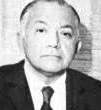
Levingston | 
Levintal |
Levingston (Laborda), Roberto Marcelo (b. Jan. 19, 1920, San Luis, Argentina - d. June 17, 2015, Buenos Aires, Argentina), president of Argentina (1970-71).
Levinson, Karl (Samuel) (b. Oct. 2, 1885, Stockholm, Sweden - d. Aug. 29, 1971, Stockholm), governor of Stockholm (1938-52).
Levintal, Aleksandr (Borisovich) (b. Oct. 18, 1957, Birobidzhan, Yevreyskaya autonomous oblast, Khabarovsk kray, Russian S.F.S.R. [now in Yevreyskaya autonomous oblast, Russia]), governor of Yevreyskaya autonomous oblast (2015-19).
Levitin, Mark (Filippovich) (b. 1891, Nakhichevan-na-Donu, Don Cossack Host, Russia [now part of Rostov-na-Donu, Rostov oblast, Russia] - d. [executed] Feb. 8, 1938), executive secretary of the Communist Party committee of the Mountain A.S.S.R. (1923). He was also chairman of the revolutionary committees of Samara (1918), Tomsk (1920), and Semipalatinsk (1920-...) provinces and the Executive Committee of Semipalatinsk province (192...-21) and executive secretary of the party committees of Semipalatinsk (1921) and Irkutsk (1922-23) provinces.
Levitin, Vyacheslav (Leonidovich) (b. Oct. 14, 1949, Roslavl, Smolensk oblast, Russian S.F.S.R.), head of Mangistau oblast (1995-97).
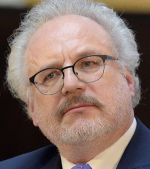
Levits |
Levits, Egils (b. June 30, 1955, Riga, Latvian S.S.R.), president of Latvia (2019- ). He was also ambassador to Germany and Switzerland (1992-93) and Austria, Switzerland, and Hungary (1994-95) and a deputy prime minister and justice minister (1993-94).
Levitte, Jean-David (b. June 14, 1946, Moissac, Tarn-et-Garonne, France), French diplomat. He was permanent representative to the United Nations (2000-02) and ambassador to the United States (2002-07).

Levy |
Levy, David (b. Dec. 21, 1937, Rabat, Morocco), Israeli politician. He immigrated to Israel with his family in 1957. He entered politics with the upstart Herut Party, which was trying to improve the lot of Sephardic Jews, a group long considered the disenfranchised underclass. His first important party job was chairman of the Herut faction of the Histadrut, Israel's enormous labour organization. In 1969 he won a seat in the Knesset. In 1977, Menachem Begin's Likud bloc (which included Herut) pulled off the biggest political upset in the nation's short history, and Levy became minister of immigrant absorption (1977-81) and minister of construction and housing (1979-90). He quickly distinguished himself by becoming a spokesman for the underclass and proving himself a savvy politician who could protect his own interests. He secretly financed a new Jewish settlement in the Christian quarter of Old Jerusalem and was blamed for ruining Israel's unblemished record of support for separate worship in the Old City. He established himself as an important Likud asset and became a deputy prime minister (1981-92) and foreign minister (1990-92). He bolted Likud in 1995 over differences with party leader Benjamin Netanyahu and founded the Gesher party, but later he joined Netanyahu's right-wing alliance in the number two spot, and in 1996 he became a deputy prime minister and foreign minister again but he resigned in 1998, citing lack of progress on the peace process and the government's indifference to the needs of low-income workers. He took his party into Ehud Barak's One Israel alliance, became a deputy prime minister and foreign minister for a third time in 1999, but pulled out again in 2000. In 2002 he was briefly minister without portfolio under Ariel Sharon.
Lévy, Georges (Adolphe) (b. June 11, 1867, Paris, France - d. 19...), governor of French Guiana (1916-17).
Levy, Joaquim (Vieira Ferreira) (b. Feb. 17, 1961, Rio de Janeiro, Brazil), finance minister of Brazil (2015).
Levy-Abekasis, Orly (b. Nov. 11, 1973, Beit She'an, Israel), Israeli politician; daughter of David Levy. She has been minister of community strengthening and advancement (2020- ).
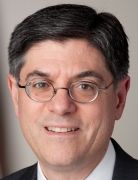
Lew |
Lew, Jack, byname of Jacob Joseph Lew (b. Aug. 29, 1955, New York City), U.S. treasury secretary (2013-17).
Lewandowski, Bohdan (b. June 29, 1926, Ostroleka, Poland - d. March 25, 2013), Polish diplomat. He was permanent representative to the United Nations (1960-66).
Lewandowski, Janusz (Antoni) (b. June 13, 1951, Lublin, Poland), Polish politician. He was minister of privatization (1991, 1992-93) and EU commissioner for financial programming and budget (2010-14).
Lewandowski, Wincenty (Janusz) (b. April 5, 1937, Piotrków Kujawski, Poland), acting finance minister of Poland (1989).
Lewenhaupt, Carl greve (b. March 19, 1835, Riseberga parish, Kristianstad [now in Skåne], Sweden - d. Dec. 10, 1906, Helsingborg, Sweden), foreign minister of Sweden (1889-95); nephew of Patrik greve Lewenhaupt. He was also minister to the United States (1876-84), France (1884-89), and the United Kingdom (1895-1902).
Lewenhaupt, Mauritz Axel greve (b. July 5, 1791, Östra Vingåker socken, Södermanland, Sweden - d. Jan. 12, 1868, Stockholm, Sweden), acting governor of Stockholm city (1842-44).
Lewenhaupt, (Adolph) Patrik greve (b. June 22, 1794, Alingsås, Älvsborg [now in Västra Götaland], Sweden - d. Oct. 21, 1871, Lund, Malmöhus [now in Skåne], Sweden), governor of Halland (1843-60); cousin of Mauritz Axel greve Lewenhaupt.
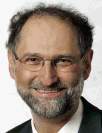
Lewin |
Lewin, Ralph (b. May 21, 1953), president of the government of Basel-Stadt (2000-01, 2005-06).
Lewis, Sir Allen (Montgomery) (b. Oct. 26, 1909, Castries, Saint Lucia - d. Feb. 18, 1993), governor (1974-79) and governor-general (1979-80, 1982-87) of Saint Lucia; knighted 1968.
Lewis, Andrew L(indsay), Jr., byname Drew Lewis (b. Nov. 3, 1931, Philadelphia, Pa. - d. Feb. 10, 2016, Prescott, Ariz.), U.S. transportation secretary (1981-83).
Lewis, Brandon (b. June 20, 1971, London, England), British justice secretary (2022). He was also Northern Ireland secretary (2020-22).
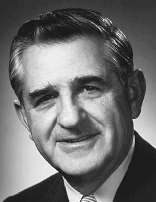
D. Lewis |
Lewis, David, original name Dawid Losz (Russian David Losh) (b. June 23, 1909, Swislocz [Svisloch], Russia [now Svislach, Belarus] - d. May 23, 1981, Ottawa, Ont.), Canadian politician. The son of a Pole who immigrated to Canada in 1921, he helped lay the foundations for the Cooperative Commonwealth Federation as its secretary from 1937 to 1950. He was national chairman/president of the CCF from 1954 to 1961 and when the party transformed into the New Democratic Party (NDP) he was elected a federal vice-chairman at its founding convention in 1961. The following year he was elected to the House of Commons as a member for York South but he lost his seat in 1963. He regained his seat in 1965 and retained it in the 1968 and 1972 elections. He replaced T.C. Douglas as NDP leader in 1971. His greatest success came in 1972 when he launched a campaign against "corporate welfare bums" who were receiving government concessions and aid and led the NDP to its strongest position ever, with 31 seats and the balance of power in the Commons. During this period he used his influence and oratorical skill to increase benefits for veterans and the elderly and to establish a national oil company, Petro-Canada. In 1974 the NDP withdrew its support from the Liberal government, and in the subsequent elections Lewis lost his own seat. He retired from politics in 1975. In 1980 the Canadian Labour Congress presented to Lewis its first Award for Outstanding Service to Humanity.
Lewis, Ernest Gordon, byname Toby Lewis (b. Sept. 26, 1918, Otago, New Zealand - d. Dec. 29, 2006, London, England), commissioner of the Turks and Caicos Islands (1955-58) and governor of the Falkland Islands (1971-75).
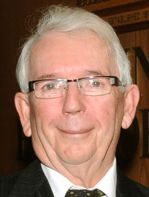
F. Lewis |
Lewis, (Harry) Frank (b. 1939, York, P.E.I.), lieutenant governor of Prince Edward Island (2011-17).
Lewis, Sir George Cornewall, (2nd) Baronet (b. April 21, 1806, London, England - d. April 13, 1863, Old Radnor, Powys, Wales), British chancellor of the exchequer (1855-58), home secretary (1859-61), and war secretary (1861-63). He succeeded as baronet in 1855.
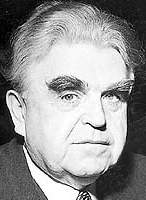
J.L. Lewis |
Lewis, John L(lewellyn) (b. Feb. 12, 1880, near Lucas, Iowa - d. June 11, 1969, Washington, D.C.), U.S. labour leader. In Panama, Ill., he became head of a United Mine Workers of America (UMWA) local, and in 1911 he became an organizer for the American Federation of Labor (AFL), with which the UMWA was affiliated. He became a vice president of the UMWA in 1917, acting president (for Frank J. Hayes) in 1919, and was its president from 1920 to 1960. Pres. Franklin D. Roosevelt's New Deal (from 1933) presented organized labour with opportunities that Lewis exploited with energy and imagination. In 1935 he joined several other AFL union leaders and formed the Committee for Industrial Organization to organize workers in mass-production industries. The more traditional leaders of the AFL favoured limiting its membership to craft unions and refused to support the new strategy, so Lewis and seven other dissident union heads left the AFL to organize what became the Congress of Industrial Organizations (CIO), with Lewis as its president. The CIO proved so successful that by the end of 1937 it had more members than the AFL. Lewis was a lifelong Republican, but he had supported Roosevelt for the presidency in 1932 and 1936. He opposed a third term for Roosevelt, however, and threatened to resign as CIO president if Roosevelt won. Taking Roosevelt's victory as a repudiation of his own leadership, Lewis resigned as president of the CIO in 1940 and in 1942 pulled the UMWA out of the parent body. A series of miners' strikes called by Lewis in the 1940s won wage increases and new benefits for miners but caused anti-union sentiment which spurred the passage of the Smith-Connally Act (1943) and the Taft-Hartley Act (1947), both of which placed new restrictions on labour unions.

L. Lewis |
Lewis, Lowell (Lyttleton) (b. Aug. 18, 1952, Kinsale, Montserrat), chief minister of Montserrat (2006-09).
Lewis, Morgan (b. Oct. 16, 1754, New York City - d. April 7, 1844, New York City), governor of New York (1804-07); brother-in-law of Edward Livingston, Robert R. Livingston, and John Armstrong, Jr.
Lewis, Stephen Henry (b. Nov. 11, 1937, Ottawa, Ont.), Canadian diplomat; son of David Lewis. He was permanent representative to the United Nations (1984-88) and UN special envoy for HIV/AIDS in Africa (2001-06).

V. Lewis |
Lewis, Sir Vaughan (Allen) (b. May 17, 1940), prime minister, foreign minister, and finance minister of St. Lucia (1996-97); knighted 2016; son of Sir Allen Lewis. In July 1982 he became director-general of the Organization of Eastern Caribbean States (OECS). He resigned that post Dec. 1, 1995, and on Jan. 21, 1996, was elected political leader of the United Workers Party. On February 16, he was elected to parliament for Central Castries. On March 23, he became minister without portfolio and on April 2, he was appointed prime minister. The UWP was defeated in the 1997 elections; he was its leader until 2000 and again in 2002-05.
Lewis Arango, Samuel (b. June 20, 1901, Panama City, Colombia [now in Panama] - d. Sept. 10, 1975), foreign minister of Panama (1944, 1949). He was also ambassador to the United States (1945).
Lewis Galindo, Gabriel (b. Feb. 24, 1929 - d. Dec. 19, 1996, Denver, Colo.), foreign minister of Panama (1994-96); son of Samuel Lewis Arango. He was also ambassador to the United States (1977-79).
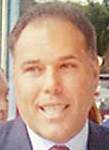
Lewis N. |
Lewis Navarro, Samuel (b. July 15, 1957, Panama City, Panama), first vice president and foreign minister of Panama (2004-09); son of Gabriel Lewis Galindo.

Lewites |
Lewites (Rodríguez), Herty (b. Dec. 24, 1939, Jinotepe, Nicaragua - d. July 2, 2006, Managua, Nicaragua), Nicaraguan politician. He rebelled against the Somoza family dictatorship in 1960 by joining an attack on a local police barracks. He fled into exile, studying in Mexico and spending much of the 1970s in Inglewood, Calif., organizing support for the Sandinista rebels. He later acknowledged shipping guns to the rebels. For that, he recalled spending six months behind bars in the Terminal Island federal prison in Los Angeles. After the Sandinistas seized power in 1979, he became tourism minister in Daniel Ortega's government, building a convention centre and beach resorts. The Sandinistas lost power in 1990, but he became mayor of Managua in 2000-04. He was expelled from the Sandinista National Liberation Front in March 2005 after challenging party chief Ortega and then formed his own Sandinista Renewal Movement. He was a candidate for the November 2006 presidential elections (running third in opinion polls, behind Ortega and Eduardo Montealegre), but died during the campaign.
Lexa von Aehrenthal, Aloys (Leopold Johann Baptist) Graf (b. Nov. 27, 1854, Gross-Skal, Austria [now Hrubá Skála, Czech Republic] - d. Feb. 17, 1912, Vienna, Austria), foreign minister of Austria-Hungary (1906-12). He was also minister to Romania (1895-99) and ambassador to Russia (1899-1906). In 1909 he was raised from Freiherr (baron) to Graf (count).
Leyden van Westbarendrecht, Frédéric Auguste van (b. Feb. 18, 1768, Haarlem, Netherlands - d. Nov. 25, 1821, The Hague, Netherlands), interior minister of Holland (1808) and governor of Zuid-Holland (1814-17).
Leydin, Reginald Sylvester (b. May 15, 1905 - d. 1993), administrator of Nauru (1954-58, 1962-66) and Norfolk Island (1958-62).
Léyé (Lenelcau Manatawai), Jean-Marie (b. 1932, Aneityum island, New Hebrides [now Vanuatu] - d. Dec. 9, 2014, Port Vila, Vanuatu), president of Vanuatu (1994-99).
Leyen, Ursula (Gertrud) von der, née Albrecht (b. Oct. 8, 1958, Ixelles, near Brussels, Belgium), defense minister of Germany (2013-19) and president of the European Commission (2019- ); daughter of Ernst Albrecht. She was also minister of family, senior citizens, women, and youth (2005-09) and labour and social affairs (2009-13).
Leygues, Georges (Jean Claude) (b. Oct. 26, 1857, Villeneuve-sur-Lot, Lot-et-Garonne, France - d. Sept. 2, 1933, Saint-Cloud, Seine-et-Oise [now in Hauts-de-Seine], France), prime minister and foreign minister of France (1920-21). He was also minister of public instruction and fine arts (1894-95, 1898-1902), interior (1895, 1930-31), colonies (1906), and marine (1917-20, 1925-26, 1926-30, 1932-33).
Leymang, Gérard (b. 1937, Malekula island, New Hebrides [now Vanuatu] - d. April 30, 2002, Nouméa, New Caledonia), chief minister of the New Hebrides (1978-79).
Leytón, Vicente, interior and justice minister (1939-40), finance minister (1949), and defense minister (1949) of Bolivia. He was also minister of industry and commerce (1938-39) and propaganda (1939-40).
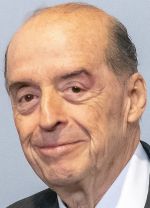
Á. Leyva |
Leyva (Durán), Álvaro (b. Aug. 29, 1942, Bogotá, Colombia), foreign minister of Colombia (2022- ). He was also minister of mines and energy (1984-85).
Leyva (Urdaneta), Jorge (b. July 4, 1912, Bogotá, Colombia - d. Dec. 23, 1968, Bogotá), Colombian presidential candidate (1958, 1962). He was also minister of commerce and industry (1949) and public works (1950-53) and governor of Cundinamarca (1949-50). He was appointed minister of war just before the 1953 coup, when he was arrested.
Leyva Mortera, Xicoténcatl (b. April 4, 1940, Xalapa, Veracruz, Mexico - d. Sept. 30, 2021, Tijuana, Baja California, Mexico), governor of Baja California (1983-89). He was also mayor of Tijuana (1977-80).
Leyva Velázquez, Gabriel (b. June 30, 1896, San Ignacio, Sinaloa, Mexico - d. March 20, 1985, Mexico City, Mexico), governor of Sinaloa (1935-36, 1957-62). He was also president of Mexico's Institutional Revolutionary Party (1952-56).
Lezama (Bagez), Arturo (b. 1899 - d. 1964), president of the National Council of Government of Uruguay (1957-58).
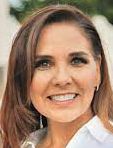
M. Lezama |
Lezama Espinosa, Mara, byname of María Elena Hermelinda Lezama Espinosa (b. Sept. 29, 1969, Mexico City, Mexico), governor of Quintana Roo (2022- ). She was also mayor of Benito Juárez municipality (Cancún) (2018-21, 2021-22).
Lezhja, Gjergj (Kostë) (b. Oct. 14, 1957), acting interior minister of Albania (2007).
Lezhnev-Finkovsky, Pyotr (Yakovlevich) (b. Jan. 10, 1902, Glushkovo, Tver province, Russia - d. Jan. 20, 1958, Moscow, Russian S.F.S.R.), executive secretary of the Communist Party committee of Mari autonomous oblast (1922-23).
L'Helgoualc'h, Victor (Édouard Marie) (b. May 15, 1870, Bannalec, Finistère, France - d. July 31, 1968, Thizy, Rhône, France), acting resident-superior of Cambodia (1922-24).
Lho Shin Yong (b. Feb. 28, 1930, Kanso, Korea [now in North Korea] - d. Oct. 21, 2019, Seoul, South Korea), foreign minister (1980-82) and prime minister (1985-87) of South Korea. He was also ambassador to India (1973-76).
L'Hopiteau, Gustave (Émile Joseph) (b. April 26, 1860, Ecrosnes, Eure-et-Loir, France - d. Oct. 3, 1941, Chartres, Eure-et-Loir), justice minister of France (1920-21).
















































































































